 01/10/2009 01:35 01/10/2009 01:35 |
|
| | | OFFLINE | | Post: 18.527
Post: 1.180 | Registrato il: 28/08/2005
Registrato il: 20/01/2009 | Administratore | Utente Veteran | |
|
 All earlier posts for 9/30/09 are on the preceding page.
All earlier posts for 9/30/09 are on the preceding page.

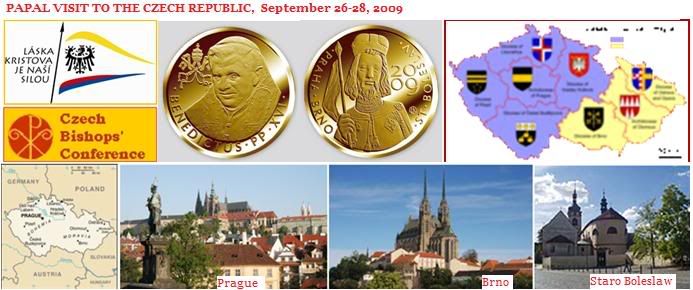 Thanks to Father Z
Thanks to Father Z
 for sharing with his readers this beautiful letter from a Czech Catholic, who gives us a unique perspective on the papal trip... What a sensitive soul, whose Catholic heart is obviously right where it should be! An eye-opening account that brought me to tears. No journalist could have done better.
LETTER FROM THE CZECH REPUBLIC:
for sharing with his readers this beautiful letter from a Czech Catholic, who gives us a unique perspective on the papal trip... What a sensitive soul, whose Catholic heart is obviously right where it should be! An eye-opening account that brought me to tears. No journalist could have done better.
LETTER FROM THE CZECH REPUBLIC:
Much more to Pope's visit
than met the eye!
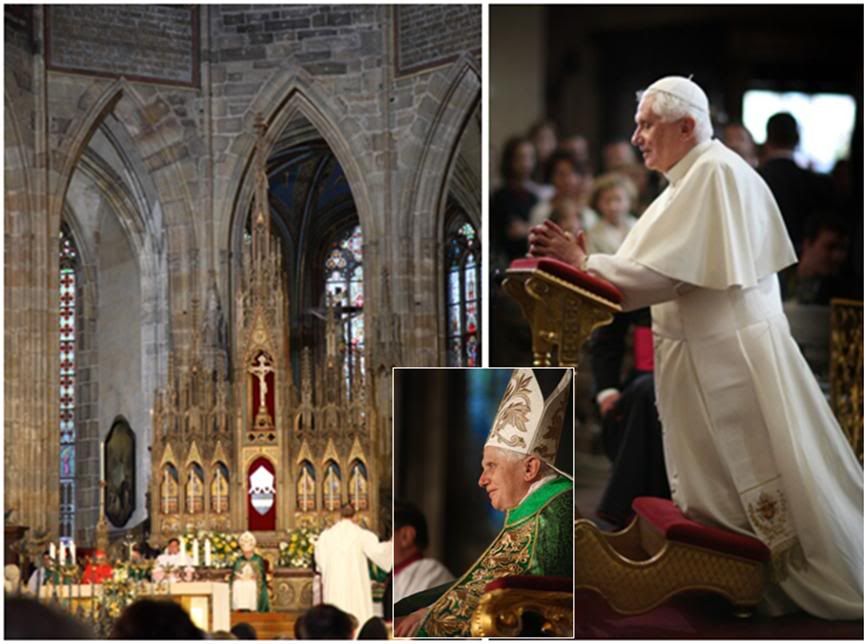 Left photo and inset, the Holy Father at St. Vitus Cathedral; right, venerating the Infant Jesus of Prague.
Left photo and inset, the Holy Father at St. Vitus Cathedral; right, venerating the Infant Jesus of Prague.
I come from the Czech Republic and I am quite frustrated that the Pope`s visit gets such a negative response in the English blogs – or no response at all… In reality, it was fantastic!
There was a lot of symbolism which foreigners do not understand. For example: The first place he went (at his own request), the church of Our Lady of Victory, it is THE church – the symbol of re-Catholisation of the country.
In the year 1620, Catholics defeated Protestants and this particular church in Praha got the name "victorious". A [superior] general of the Carmelites, P. Dominic a Jesu Maria, found a picture of Our Lady in South Bohemia, where Protestants had erased Her and little Jesus's`eyes – he took the picture with him, and before the battle of White Mountain he showed it to the Catholic army generals and asked them to attack and promised God`s help. They did it, they won, and the Carmelites got that church afterwards. (The picture P. Dominic found, was to be seen in Sta Maria della Vittoria in Roma until the 19th century.) The catholic king of Bohemia, Emperor Ferdinand II, punished the protestant rebels (who began the 30 Years War) and threw them out of the country.
In 1918, when the Habsburg empire collapsed, the Czech republican politicians wanted to distance them from the past and created the Czech Hussite church. The majority of the people stayed Catholic, but the "political correct" historiography at schools became: "We are a Hussite country, catholics were the bad ones in history".
One gets brainwashed with this still now at school, even the most people believing in God are Catholics – Protestants are very very few.
It was extremely courageous of Benedikt XVI to choose just this church, the symbol itself…
The interior Church situation in the Czech republic is like this: We were spared after the Second Vatican Council of its "Spirit", because of Communism. When one fights Communism, one has no time for the "Spirit" of the Council. It came after the revolution in 1989. Some bishops we got then were bad, some weak. [This is such a surprise! The extent of the self-secularization in the Czech Church itself after the fall of Communism!] All of them afraid of Cardinal Vlk (Wolf) – one says: episcopus episcopo Lupus.
I have seen the most beautiful churches destroyed because of the "Spirit" in the 1990s, they are being destroyed still. My professor of art history comforted us students once: "Do not cry, the priests responsible for this will go to hell."
So, imagine the 1970s in Western Europe and you get the picture of the situation in the Czech republic lately. Celebrity priests (all liberal, of course) laugh at the traditional Catholic way of praying, of attitudes, of belief…
So the Pope comes now and goes to this church of Our Lady of Victory, THE Catholic Church, and gives a crown to the Infant of Prague. Can he make a better gesture to support the traditional Catholics? An intellectual, giving a crown to an old miraculous doll.
Then he meets priests and nuns in the cathedral. Does he talk to them, discuss something? No, he just prays together with them. Vespers, in Latin, nice music. (And all the Czech nuns are dressed like nuns, of course.) He demonstrates without words: This is the stuff you ought to do, this is your job – to pray.
Then he arrives in Brno in Moravia. 120,000 people come to Mass, which is in Latin, too. No big concelebration, the 40 bishops are placed somewhere invisible, only the local one concelebrates (no Vlk to be seen).
Pope says to people after the Mass: "Take care of your inherited Catholic tradition…" Then he speaks of Our Lady of Hostyn (who saved Moravians from the Tartars in 1241). He venerates Her as we always did.
All this is just the opposite of what we have always heard from Vlk and TV-priests. We got the Pope`s absolute support for all we have always believed in and what some of the bishops tried to take away from us.
Only a half year ago, Vlk threatened the Vatican with people rebellion like in Austria, because he did not get permission to appoint his successor in Praha. (He writes about it on his blog www.cardinal.cz, but only in Czech).
But now, during the visit, while we watched the live transmission, it looked like the Czech bishops got the message – they looked like they finally understood the times have changed and the "Spirit" is not popular anymore. I really hope it lasts and I hope the good nuncius gets through with a good archbishop to Praha this year, in spite of the opposition.
The good nuncius said before the papal visit: "This country has the most beautiful baroque in Europa, and it is because the churches were built while the Church was triumphant. The churches 'smile'. The landscape looks Christian. Not only because of all the churches, but there is something more in it, some Christian expression from the past still living which one should preserve."
He got it, the Nuncius, and the Pope knows it, too. He is from Bayern and he understands…
As for the politics, the visit was a success, too. The usually very arrogant Czech president looked changed. Nobody protested even when the Pope reminded us about how St. Wenceslaus behaved to his neighbour countries – again, foreigners do not understand, but St. Wenceslaus did not want war with the Germans, so he prefered to be a subject of the German emperor and pay tribute. Now there are quarrels with Sudeten Germans about the property confiscated after the last war.. It was so brave of Benedikt XVI to mention this –
He touched dynamite at every step, he was very brave, and proudly (for once) I must say, he was well received, both by the politicians and by the bishops. (Normal catholics love him, of course.)
Sorry about a mail so long, but as I appreciate your articles, I just wanted you to know that there was more to this visit than the eyes of foreigners can see. It was a victory!
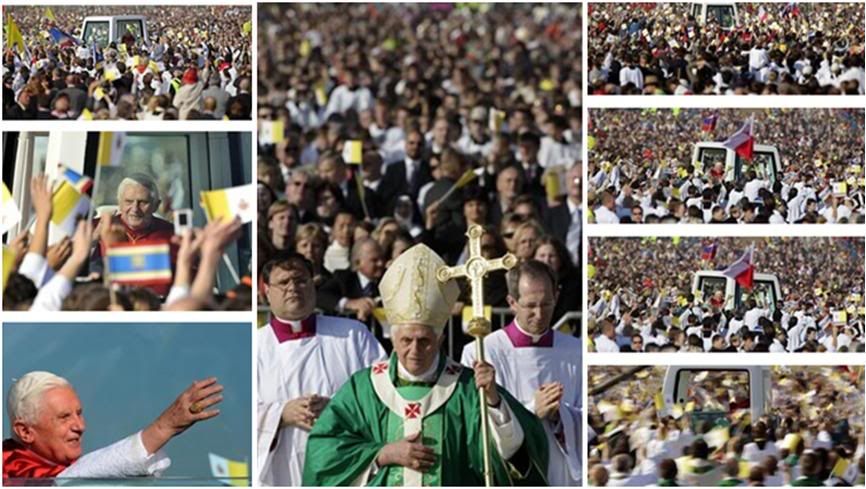
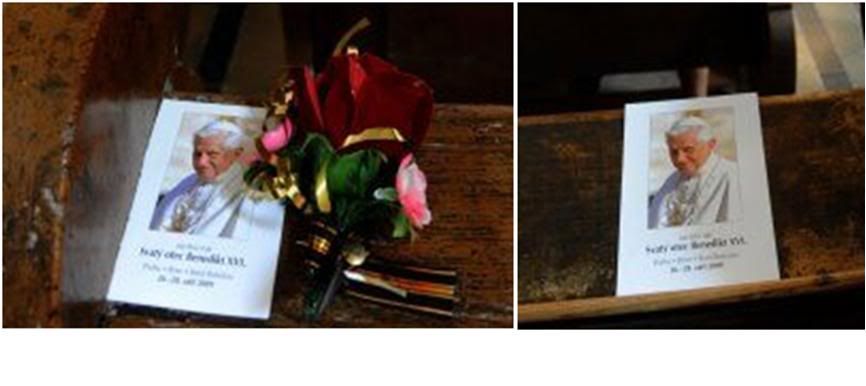 GOD BLESS HIM OR HER, THIS WONDERFUL CZECH CATHOLIC! If the rest of the remaining observant Czech Catholics are as centered in their faith as he or she seems to be, then they will indeed be the creative minority that can shape the future of their county.
GOD BLESS HIM OR HER, THIS WONDERFUL CZECH CATHOLIC! If the rest of the remaining observant Czech Catholics are as centered in their faith as he or she seems to be, then they will indeed be the creative minority that can shape the future of their county.
And what can one say about the wisdom of our dear Pope who must have been aware of all the undercurrents described in the letter and shaped his program and his messages accordingly. DEO GRATIAS!
[Modificato da TERESA BENEDETTA 01/10/2009 21:45] |
| |
|
| |
 01/10/2009 14:32 01/10/2009 14:32 |
|
| | | OFFLINE | | Post: 18.528
Post: 1.181 | Registrato il: 28/08/2005
Registrato il: 20/01/2009 | Administratore | Utente Veteran | |
|
 Thursday, Oct. 1
Thursday, Oct. 1
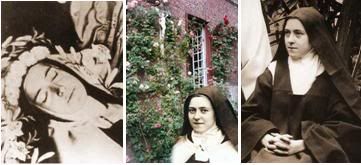 ST. THERESE OF LISIEUX (France, 1873-1897)
ST. THERESE OF LISIEUX (France, 1873-1897)
Carmelite nun, Doctor of the Church
'Little Flower of Jesus'
OR today.
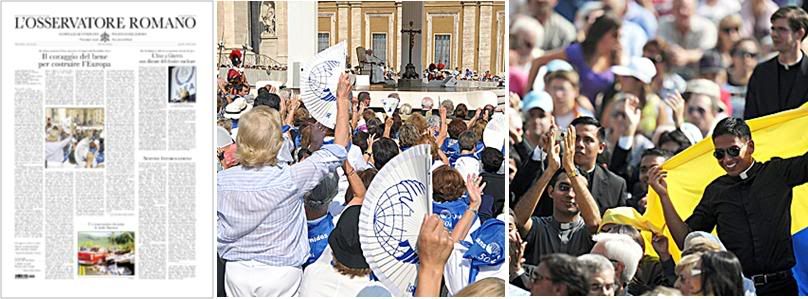
At the General Audience, the Pope reviews his trip to the Czech Republic:
'The courage to do good in order to build Europe'
Other Page 1 stories: Iran begins talks with US and 5 other nations but reiterates it won't discuss its nuclear development program; a tsunami
strikes the Samoa islands of the South Pacific. In the inside pages is an essay from a new book of commentaries on Caritas in veritate, and
an essay by Marcello Pera showing that the culture of human rights derived from the moral law of Christianity. NB: Perhaps someone can explain
why the OR chose to use two absolutely routine pictures of the GA neither of which even shows the Pope.
THE POPE'S DAY
The Holy Father met today with
- H.E. Asif Ali Zardari, President of Pakistan, and delegation
- Cardinal William Joseph Levada, Prefect of the Congregation for the Doctrine of the Faith
- Cardinal Franc Rodé, Prefect of the Congregation for the Institutes of Consecrated Life and Societies of Apostolic life
- Civlian and military authorities, the religious community; and law and order personnel of Castel Gandolfo.
Address in Italian.
And in the afternoon:
- Staff of the Pontifical Villas and their families.
The Pope returns to the Vatican on Saturday, Oct. 3, after spending most of the summer in Castel Gandolfo.
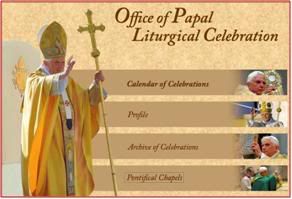
The Office for Liturgical Celebrations has
a new webpage banner and this reminder:
Sunday, Oct. 11
XXVIII Sunday in Ordinary Time
10:00 St. Peter's Square
CAPPELLA PAPALE
for the Canonization of
- ZYGMUNT SZCZĘSNY FELIŃSKI, (1822-1895), Bishop, Founder of the Congregation of the Franciscan Sisters
of the Family of Mary
- FRANCISCO COLL Y GUITART, (1812-1875), Dominican priest, Founder of the Congregation of the Dominican Sisters of the Annunciation
- JOZEF DAAMIAN DE VEUSTER, (1840-1889), Priest, Congregation of the Sacred Hearts of Jesus and Mary and of the Perpetual Adoration of the Most Blessed Sacrament of the Altar
- RAFAEL ARNÁIZ BARÓN, (1911-1938), Religious, Cistercian Order of Strict Observance
- MARIE DE LA CROIX (JEANNE) JUGAN, (1792-1879), Virgin, Founder of the Congregation of the Little Sisters of the Poor.
Also, this Saturday, Oct. 3, Cardinal Tarcisio Bertone, Secrretary of State, will take possession of the
Suburbicarian Church of Frascati. He succeeded as Titular Archbishop following the death of Cardinal Barragan.
THE HOLY FATHER'S
PRAYER INTENTIONS
FOR OCTOBER 2009
General intention:
"That Sunday may be lived as the day on which Christians gather
to celebrate the risen Lord, participating in the Eucharist."
Mission intention:
"That the entire People of God, to whom Christ entrusted the mandate
to go and preach the Gospel to every creature, may eagerly assume
their own missionary responsibility and consider it the highest service
they can offer humanity."
[Modificato da TERESA BENEDETTA 02/10/2009 00:57] |
| |
 01/10/2009 14:44 01/10/2009 14:44 |
|
| | | OFFLINE | | Post: 18.529
Post: 1.182 | Registrato il: 28/08/2005
Registrato il: 20/01/2009 | Administratore | Utente Veteran | |
|
 Now, Cyprus too in 2010
Translated from
Now, Cyprus too in 2010
Translated from
the Italian service of

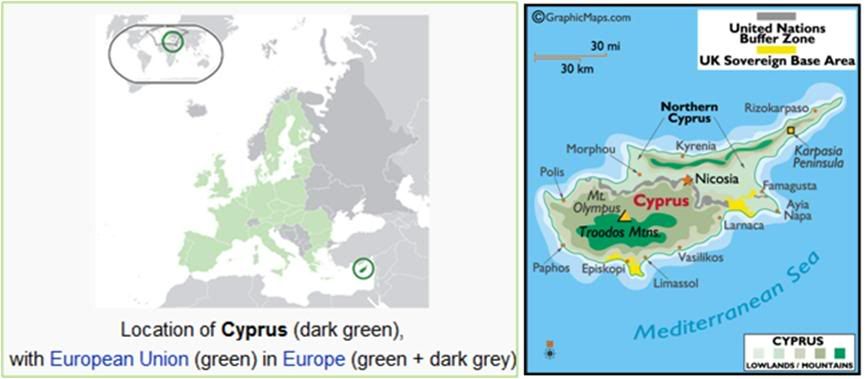
Oct. 1 (RV) - The government of Cyprus announced today that Benedict XVI has accepted the invitation to visit Cyprus.
The invitation was extended to the Pope by the Church of Cyprus and the President of the Republic, Demetris Christofias, when he visited the Vatican on March 27.
The visit will take place in early June next year.
The Church of Cyprus, represented by the Latin Patriarch of Jerusalem, Mons. Fouad Twal, and the Maronite Archbishop of Cyprus, Josef Souaef, along the Custodian of the Holy Land, Fr. Pierbattista Pizzaballa, expressed their joy for the coming visit.
[Previously announced were papal visits to Malta, Fatima and possibly the United Kingdom in 2010.]
About Cyprus: Although the Republic of Cyprus has de jure sovereignty over the entire island (except for the UN zone and military bases) and territorial waters, it only has effective control of southwest Cyprus (57% of the territory). Northeastern Cyprus is effectively under Turkish control and calls itself the Turkish Republic of Northern Cyprus.
A few more details from SIR:
Cyprus trip likely
to be June 6-9

ROME, Oct. 1 (Translated from SIR) - Benedict XVI will be visiting Cyprus in June 2010.
The news announced today, Cyprus's Independence Day, by the government in Nicosia was also confirmed to SIR by the Patriarchal Vicariate in Nicosia.
"We do not have details yet about the visit," the source said, "but it would be in June 2010. And it is possible that one stop will be Paphos, where the Apostle Paul had spent some time to preach the Gospel".
The likely dates for the visit are June 4-6.
The Custodian of the Holy Land, Franciscan Fr. Pierbattista Pizzaballa, told SIR that "The dates still have to be confirmed, along with the possibility that Benedict XVI may use the occasion to hand over to the Patriarchs and bishops of the Middle East the Instrumentum Laboris for the Bishops' Synod special assembly for the Middle East to be held in the Vaitican in october 2010".
The Vicariate in Nicosia said that "The Christian community on the island has received the news with great enthusiasm and are now starting to prepare as best they can for such an event".
The papal visit would, in effect, return the visit to the Vatican of President Demetris Christofias last March 27 and of the earlier visit in June 2007 by the Aechbishop of New Justinian and all Cyprus, Chrysostomos II, head of the autocephalous Cyprus Orthodox Church.
The Vatican confirms
By NICOLE WINFIELD

VATICAN CITY, Oct. 1 (AP) – Pope Benedict XVI will visit Cyprus next year, the Vatican said Thursday, bringing to four the number of foreign trips planned for the pontiff in 2010.
Cyprus has been mentioned as a possible venue for a long-sought meeting between Benedict and the Russian Orthodox patriarch. However, Vatican spokesman the Rev. Federico Lombardi said he knew nothing about any such meeting.
The Cypriot government said Thursday the Pope would visit in June. Vatican Radio, in reporting on the Cypriot announcement, said the news of the trip had been received "with joy" by top Catholic officials in the region.
In addition to Cyprus, the 82-year-old Benedict's 2010 travel schedule includes possible trips to Malta; Fatima, Portugal; and Britain.
A top Vatican official, Cardinal Walter Kasper, said last month that relations between the Vatican and Russian church had vastly improved, paving the way for a possible meeting in a third country between Benedict and Russian Patriarch Kirill.
In 2007, a Cypriot Orthodox archbishop, Chrysostomos II, met with Vatican and Russian Orthodox officials and proposed Cyprus as the location.
Such an encounter eluded the late John Paul II in his long papacy because of Catholic-Orthodox tensions following the demise of Soviet communism.
Something related which I completely overlooked during the Czech visit:
UK trip, Newman beatification
in 2010 a 'good hypothesis'

PRAGUE. Sept. 27 - In a briefing with reporters in the Czech capital, Vatican spokesperson Fr. Federico Lombardi stopped short of official confirmation of a rumored papal trip to Great Britain for 2010, but suggested that it’s likely. He added that such a trip would be an "obvious occasion" to beatify Cardinal John Henry Newman.
Lombardi also said that outings in 2010 to both Malta and Portugal are in the works, but that preparations still have to be made.
The Malta trip, set for April, has already been announced by the Maltese bishops. It will commemorate the 1,950th anniversary of St. Paul’s famous shipwreck on the Mediterranean island. The Pontiff’s trip to Portugal has likewise been quasi-official for some time, set for the Feast of Our Lady of Fatima on May 13.
Lombardi said that the main organizer of papal travel, Alberto Gasparri, has not yet worked out the details of trips to either location.
News broke earlier this week of a possible outing to Great Britain and Ireland, which could include a beatification ceremony for Newman, the 19th century intellectual and convert to Catholicism who has long been slightly controversial for his ambivalence about the doctrine of papal infallibility.
Nonetheless, Pope Benedict XVI has frequently praised Newman’s life and work, seeing in him a kindred intellectual spirit.
Lombardi said this evening that a trip to the U.K. is a “good hypothesis,” that it would likely take place in September (rather than January as some news outlets had suggested), and that “it would be an obvious occasion” to beatify Newman.
When a reporter noted that Benedict XVI has previously expressed a preference to allow beatifications to be carried out by the local Church rather than by the Pope*, Lombardi responded: “We have a year to figure that out.”
*I think the correct sense of Benedict XVI's policy is that beatifications are more properly performed in the particular Church where the new Blessed is venerated. In the normal course of things, this has meant the rite has been presided over by the local bishop with the attendance of a personal representative of the Pope. But obviously, if the Pope is going to be in the new Blessed's Church at the time of the beatification, why would he not do it? Especially in this particular case!
[Modificato da TERESA BENEDETTA 02/10/2009 01:04] |
| |
 01/10/2009 17:04 01/10/2009 17:04 |
|
| | | OFFLINE | | Post: 18.533
Post: 1.186 | Registrato il: 28/08/2005
Registrato il: 20/01/2009 | Administratore | Utente Veteran | |
|
 Pope meets Pakistan president
Pope meets Pakistan president
at summer retreat

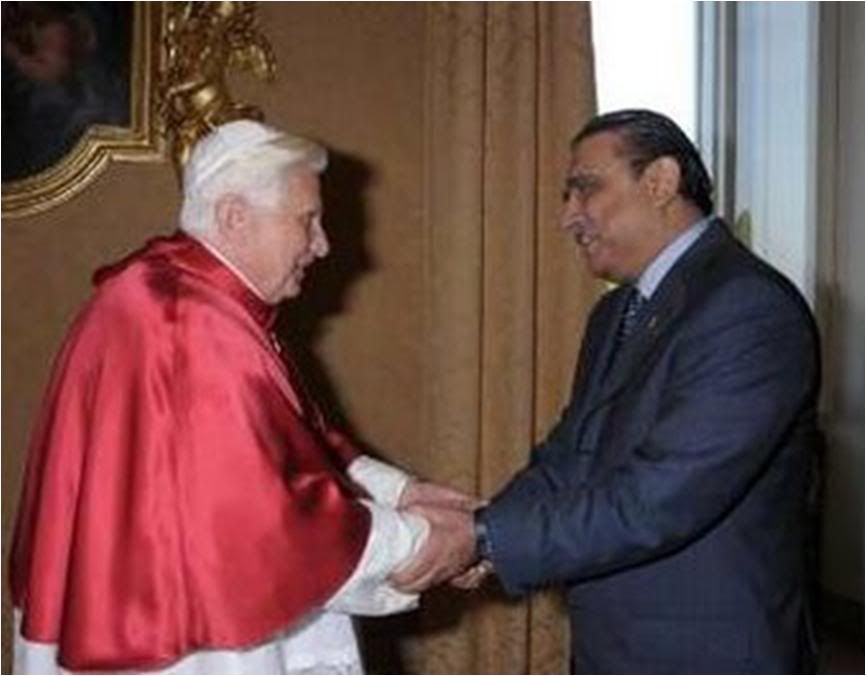
CASTEL GANDOLFO, Italy – The Pope and Pakistani President Asif Ali Zardari met Thursday in Castel Gandolfo, near Rome.
The Vatican says Benedict XVI and the President discussed the need to end religious discrimination during a meeting at the papal summer retreat.
Tensions have flared in recent months between Pakistan's Muslim minority and its religious minorities. In one case, eight Christians were burned to death by a Muslim mob after reports that a Quran had been desecrated.
The Vatican said the two stressed "the need to overcome all forms of discrimination based on religious affiliation, with the aim of promoting respect for the rights of all."
Non-Muslims make up less than 5 percent of Pakistan's 175 million people.
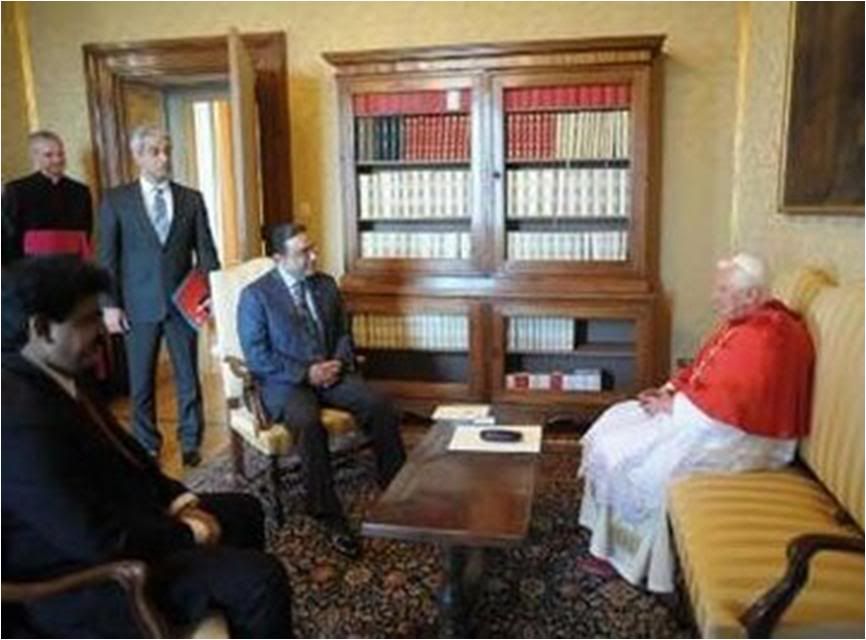 The Vatican communique, issued in Italian and English, after the meeting:
The Vatican communique, issued in Italian and English, after the meeting:

Today in the Apostolic Palace of Castelgandolfo, the Holy Father Benedict XVI received in audience Asif Ali Zardari, president of the Islamic Republic of Pakistan. President Zardari subsequently went on to meet Cardinal Secretary of State Tarcisio Bertone S.D.B. accompanied by Archbishop Dominique Mamberti, secretary for Relations with States.
The cordial discussions provided an opportunity to examine the current situation in Pakistan, with particular reference to the fight against terrorism and the commitment to create a society more tolerant and harmonious in all its aspects.
Talk then turned to the positive role played by the Catholic Church in the social life of the country through her educational, healthcare and aid activities. Evoking recent episodes of violence against Christian communities in some localities, and the elements that have favoured such serious incidents, emphasis was given to the need to overcome all forms of discrimination based on religious affiliation, with the aim of promoting respect for the rights of all citizens.
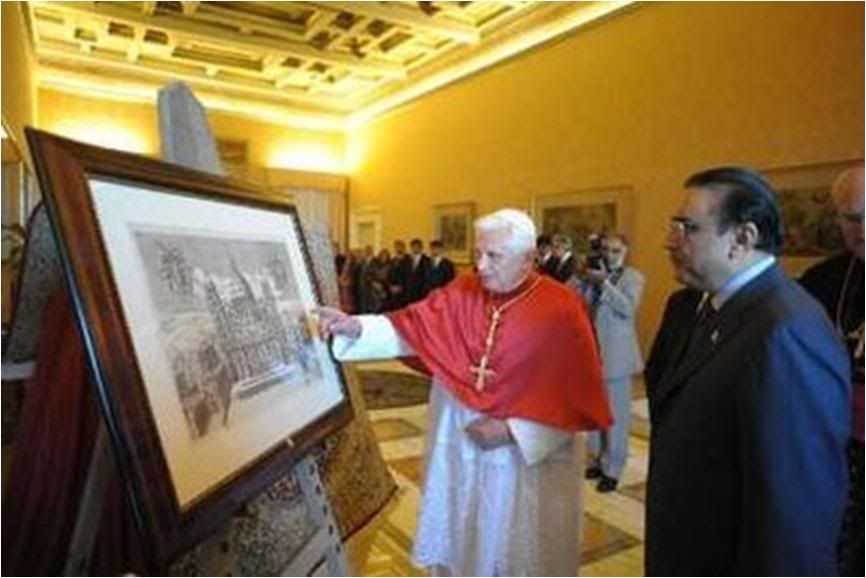
[Modificato da TERESA BENEDETTA 01/10/2009 19:37] |
| |
 01/10/2009 17:21 01/10/2009 17:21 |
|
| | | OFFLINE | | Post: 18.534
Post: 1.187 | Registrato il: 28/08/2005
Registrato il: 20/01/2009 | Administratore | Utente Veteran | |
|
 I posted an item about this last week when the Vatican announced there would be a news briefing today about it. I have chosen to use the report from the Jewish news agency for today's update.
Pope to attend concert
I posted an item about this last week when the Vatican announced there would be a news briefing today about it. I have chosen to use the report from the Jewish news agency for today's update.
Pope to attend concert
marking WWII anniversary

ROME, Oct. 1 (JTA) -- Pope Benedict XVI will attend a concert to mark the 70th anniversary of the outbreak of World War II, the Vatican announced.
The concert, scheduled for Oct. 8 in a major Rome concert hall near the Vatican, is being organized by the Vatican Commission for Religious Relations with the Jews, the Pontifical Council for Promoting Christian Unity, the German Embassy to the Holy See and a German cultural association.
A German youth orchestra will perform pieces by the Jewish-born composers Gustav Mahler and Felix Mendelssohn. In addition, poetry will be recited, including works by Holocaust survivor Paul Celan and children held prisoner in the Terezin (Theresienstadt) ghetto-concentration camp near Prague.
The concert is part of a series of Vatican events to mark the anniversary.
"We cannot forget the dramatic events that led to one of the most terrible wars in history that caused millions and millions of deaths and so much suffering," the Pope said earlier this month in a sermon given in Viterbo, Italy. The war, he said, was "a conflict that saw the tragedy of the Holocaust and the extermination of throngs of other innocents."
The Pope added, "The memory of these events impels us to pray for the victims and for the people who still bear the wounds in their body and heart. May it also be a warning to all never to repeat such barbarities and, in our time still marked by conflicts and opposition, to redouble efforts to build lasting peace, passing on especially to the new generations a culture and lifestyle marked by love, solidarity and esteem for the other."
There's more information from the Vatican bulletin today on the news briefing, particularly in the opening statement made by Cardinal Kasper:
News briefing on the concert
Translated from

At 11:30 today, in the Aula Giovanni Paolo II of the Holy See Press Office, a briefing was held on a concert to be held on October 8 in the presence of His Holiness Benedict XVI, an initiative of a movement called Youth Against War which will present the Inter-Regionales Jugendssymphonie Orchester (IRO) as part of the project "1939-2009: 70 years since the start of the Second World War".
The concert will take place on Thursday, Oct. 8, at the Auditorium on Via della Concilizazione.

Taking part at the briefing were Cardinal Walter Kasper, president of the Pontifical Council for Promoting christian Unity; H.E. Hans-Henning Horstmann, German ambassador to the Holy See; and Fr. Federico Lombardi, Vatican press director.
Here is a translation of Cardinal Kasper's presentation:
2009 is a year of important anniversaries: the events we commemorate left a profound mark on history.
Twenty years ago, in an unexpected and peaceful manner, the Wall came down which had divided Germany into two states and the world into two blocs.
Seventy years ago, with the invasion of Poland by Nazi Germany, the Second World War erupted - a war which was European at first but eventually saw 47 nations in close alliance against Hitler and his regime.
The Pontifical Council for Promoting Christian Unity and the Vatican Commission for Religious Relationships with Judaism, the German embassy to the Holy See, and the KulturForum Europeo of Mainau (Germany) are sponsoring a concert which, in re-elaborating the tragic memory of that war, can hopefully engage not only the generation which experienced its horrors but also the youth and all who wish to value the teachings from the past in order to create a better world.
This is also a reminder that in order to promote and keep the peace, the constant commitment and participation of individuals and institutions are essential.
This is precisely what the musicians coming from ten different nations wish to prove by their performance, their music and their enthusiasm.
The painful memory of the Second World War - or better still, the desire to start from a new basis - was in fact one of the factors that initiated the ecumenical movement. The Ecumenical Council of Churches was instituted on the example of the League of Nations adn the United Nations.
The Second World War was also the unfortunate occasion for the inhuman project of exterminating the Jewish people. Barbarous acts and brutalities assumed Satanic proportions in those years, leading some to think that God had forgotten or abandoned his people and all of mankind, as the Holy Father Benedict XVI recalled when he visited Auschwitz and the Synagogue in Cologne.
But even after the war ended, the wounds have remained. To heal these wounds and others, the Catholic Church became one of the principal promoters around the world of reconciliation and the process of healing memory, with an increasingly decisive voice.
This commitment provides the background for the concert. At the same time, it wishes to remind that dialog is the only alternative to war. The ecumenical movement shows how belligerent neighbors, who had in teh past wounded each other in confessional wars, have now become once again brothers in Christ , contributing to the re-pacification of peoples and nations.
Equally important to underscore is that, despite a tragic and painful past, collaboration between Christians and Jews is now founded on a solid basis. Even doubts and difficulties can be overcome in reciprocal respect and sympathy. For all this, constant prayer and daily commitment are essential. Each of us can contribute in his own way to dialog and reconciliation. Even through music.
And helping to promote this idea is an extraordinary orchestra composed of young musicians from 10 nations. Two conductors, Prof. Wolfgang Gönnenwein and Jochem Hochstenbach have accepted to work with the orchestra. Alongside them, we acknowledge the generous participation of two world-renowned actors: Prof. Klaus Maria Brandauer and Madame Michelle Breedt.
The musical program will consist of compositions by Gustav Mahler and Felix Mendlssohn Bartholdy. Two Lieder, Urlicht and Irdisches leben from Mahler's Des Knaben Wunderhorn [The boy's magic horn) cycle will follow the fourth movement of the composer's Symphony No. 5.. Mendelssohn's Fourth Symphony (Italian) will conclude the concert.
I wish to point out that the musical choices were dictated by the fact that both composers were Jewish by birth and experienced strong anti-Semitism all their life. Both were later baptized - Mendelssohn as a Protestant, Mahler as a Catholic. Under the Nazi regime, their music was forbidden.
Klaus Maria Brandauer will recite some pieces from German literature: texts by Johann Wolfgang von Goethe, Heinrich Heine, Berthold Brecht, and Paul Celan, as well as two poems written by children who were interned in the concentration camp of Theresienstadt.
We are happy that the International Jewish Committee for Inter-religious Consultations agree to be a patron for this concert. Its member organizations are: American Jewish Committee, American Jewish Congress, Anti-Defamation League, B’nai B’rith International, Central Conference of American Rabbis, Israel Jewish Council on Inter-Religious Relations, Rabbinical Assembly, Rabbinical Council of America, Union of Orthodox Jewish Congregations, Union for Reform Judaism, United Synagogue of Conservative Judaism, World Jewish Congress.
This concert has been made possible with the generous financial and organizational aid of many German and Italian corporations.
[Modificato da TERESA BENEDETTA 03/10/2009 00:27] |
| |
 01/10/2009 19:20 01/10/2009 19:20 |
|
| | | OFFLINE | | Post: 18.536
Post: 1.189 | Registrato il: 28/08/2005
Registrato il: 20/01/2009 | Administratore | Utente Veteran | |
|
 I have not read the scurrilous article referred to by Damian Thompson, nor, from past experience, do I want to. But Thompson's commentary speaks for itself, and he would not misrepresent their misrepresentations! Unfortunately, the Pope's probable visit to the UK next year provides all the hostile elements of the British media with the opportunity - and they'll have a year to do it - to raise a conflagration from the smoldering embers of the systematic defamation they have mounted periodically against Benedict XVI since he became Pope.
I have not read the scurrilous article referred to by Damian Thompson, nor, from past experience, do I want to. But Thompson's commentary speaks for itself, and he would not misrepresent their misrepresentations! Unfortunately, the Pope's probable visit to the UK next year provides all the hostile elements of the British media with the opportunity - and they'll have a year to do it - to raise a conflagration from the smoldering embers of the systematic defamation they have mounted periodically against Benedict XVI since he became Pope.
Thompson reacted to the Guardian attack in two successive blog entries, as ff:
The Guardian's repulsive attack
on Pope Benedict XVI

Sept. 29, 2009
The Guardian this morning publishes the most poisonously anti-Catholic article to have appeared in the mainstream media for decades. It’s by a freelance journalist called Tanya Gold, who presents Pope Benedict XVI as little short of a mass murderer on the basis of his support for the Church’s teaching on sexuality. I suspect that Guardian editor Alan Rusbridger will regret publishing this piece, which, on a quick reading, makes defamatory claims that it is quite unable to substantiate. No, I don’t mean that the Pope is going to sue the paper, but that its Catholic readers – even those unsympathetic to this pontificate – will react furiously to such a crude diatribe. I’m off to do some research. More on this later.
'The Guardian' has blundered in throwing
wild accusations at Pope Benedict
Today The Guardian published a vitriolic attack on Pope Benedict XVI by Tanya Gold which accused him of colluding in the protection of paedophiles and ended thus: “Welcome, Benedict XVI, Episcopus Romae, Vicar of Jesus Christ, Successor of the Prince of the Apostles… Don’t tread on the corpses.”
I described it this morning as the most poisonously anti-Catholic article to have appeared in the mainstream media in decades. However, The Guardian is anti-Catholic these days, and we do have free speech in this country, and on the whole I think professional offence-taking is a bad thing.
But, as CP Scott himself put it, “comment is free but facts are sacred”, and when Gold accuses the Pope of colluding in the protection of paedophiles she is making an accusation that requires a pretty high level of proof.
Which she doesn’t have.
She writes: “In May 2001 [the then Cardinal Ratzinger] wrote a confidential letter to Catholic bishops, ordering them not to notify the police – or anyone else – about the allegations, on pain of excommunication.”
No, he didn’t.
[It's obviously nothing new that anti-Church, anti-Pope journalists - especially in the British press - twist the facts to suit their ends, but it is right that the facts should be presented in immediate rebuttal. I don't know what the practice is in UK newspapers, but would a formal letter to the editor pointing out to demonstrably verifiable fact earn a correction by the newspaper which publishes the false, often defamatory, information?]
As Archbishop Vincent Nichols pointed out in 2006, when a BBC Panorama documentary made this allegation, the 2001 letter to bishops “clarified the law of the Church, ensuring that the Vatican is informed of every case of child abuse and that each case is dealt with properly.
“This document does not hinder the investigation by civil authorities of allegations of child abuse, nor is it a method of cover-up, as the [BBC] programme persistently claims. In fact it is a measure of the seriousness with which the Vatican views these offences.
“Since 2001, Cardinal Joseph Ratzinger, then head of the Congregation for the Doctrine of the Faith, took many steps to apply the law of the Church to allegations and offences of child abuse with absolute thoroughness and scruple.”
Gold’s article is also highly selective, not to say misleading, in its presentation of the facts relating to the Church investigation into the scandal surrounding Fr Marcial Maciel, the founder of the Legionaries of Christ.
Maciel was a favourite of Pope John Paul II, on whose instructions Cardinal Ratzinger closed down an investigation into various allegations.
Perhaps he should have refused to obey the Pope – but what Gold fails to mention is that the moment Ratzinger was free to reopen the case (ie, when JPII became mortally ill) he did so, and as Pope, he sent the dying octagenarian priest into exile while a proper investigation into this massively complicated case began.
It’s nowhere near finished, but Pope Benedict is determined that the truth comes out, even at the price of dismantling the entire order. Quite right: Maciel was a vile piece of work, a seducer of young men and the father of several illegitimate childrn – but even if you think Cardinal Ratzinger colluded in his protection, the awkward fact remains that the Mexican was not, so far as we know, a paedophile.
A nice distinction? Not in a court of law, which is where The Guardian would end up if it had made these claims about an ordinary individual.
Gold’s attack on Pope Benedict doesn’t read like the work of someone very familiar with the detail of the paedophile scandals. I’d like to know how much research actually went into it.
The sad fact is that the upper ranks of the clergy are stuffed with prelates who were complicit in the protection of paedophiles – but the former Cardinal Ratzinger, whose Congregation assumed responsibility for investigating the scandals only at the end of JPII’s pontificate, is not one of them.
On the contrary: Benedict XVI is currently engaged in “purifying” (his word) the Church of the “filth” (his word again) of priestly sex abusers. It’s one of his priorities as Pope.
It wasn’t one of John Paul II’s priorities, though it should have been. But he is dead, so Gold goes after his successor, intending to trash his reputation but actually doing serious damage to that of The Guardian.
And yesterday, Thomspon had a commentary on how the Times of London reported an important nomination today for the Church in England:
Times report of Archbishop's appointment
turns into yet another rant about sex abuse

Sept. 30, 2009
I was going to blog about the cheering news that Bishop Bernard Longley of Westminster has been appointed Archbishop of Birmingham: the announcement will be tomorrow and I’ll write about it then, because the promotion of this self-professed “conservative” to England’s second See is fascinating.
But first… what the hell is wrong with Ruth Gledhill? On the day of Archbishop Vincent Nichols’s enthronement at Westminster, the Times’s religion correspondent produced a report focussing on Irish child abuse and +Vincent’s supposedly inappropriate response to it. And now she’s done it again, damn her. This is how she announces Bishop Longley’s appointment on her blog:
Tomorrow the Holy See will name Bishop Bernard Longley as the new Archbishop of Birmingham. One of the favourites for Westminster, and already an auxiliary there, he will bring true class, wit and style to what will be a key appointment with the Newman beatification and the visit of Pope Benedict XVI pending next year.
But he will need also to be a canny operator. Because the issues around sex abuse by priests and male and female religious, of adults and teenagers as well as children, have not gone away. If anything, the signs are that they are about to return with more force than before.
So we’re on to kiddie-fiddlers by the end of the first par. That was quick. And the first person Gledhill cites? The cranky anti-Catholic bore Keith Porteous Wood, of the “International Humanist and Ethical Union”, whatever that is.
I’m not saying that The Times shouldn’t devote as much space as it thinks fit to the dreadful scandal of clerical abuse. But this business of shoe-horning the subject into virtually any story about the Catholic Church is bizarre. I’ve lost count of the number of times I’ve defended Gledhill against the charge of being anti-Catholic. More fool me.
[Modificato da TERESA BENEDETTA 01/10/2009 20:52] |
| |
 02/10/2009 02:02 02/10/2009 02:02 |
|
| | | OFFLINE | | Post: 18.537
Post: 1.190 | Registrato il: 28/08/2005
Registrato il: 20/01/2009 | Administratore | Utente Veteran | |
|
 Pope says his farewells
Pope says his farewells
to Castel Gandolfo
Translated from
the 10/2/09 issue of

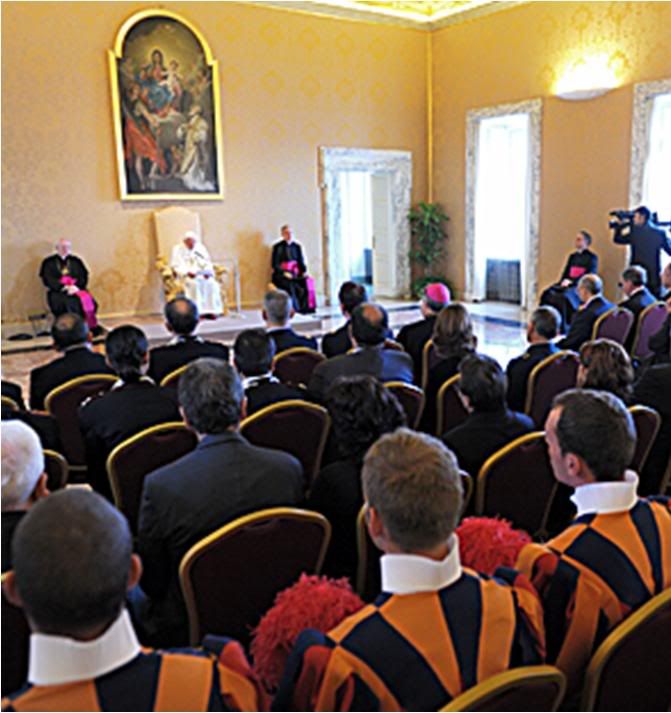
On Thursday morning, the Holy Father started saying farewell to the community oF Castel Gandolfo as he prepares to return to the Vatican Saturday after spending the months of August and September here.
He met at the Swiss Hall of the Apostolic Palace with civilian and military authorities, the religious orders, and those assigned to various services during his summer stay here.
This is a translation of his remarks to them:
Dear brothers and sisters,
I am about to to end the summer months that I spend by tradition in the residence at Castel Gandolfo. These months give me the opportunity to observe directly the generous dedication and competent commitment offered by so many persons in order to assure every assistance to me and my co-workers, and to the guests and pilgrims who come here to visit me, especially on Sundays for the traditional
Angelus.
For all of this, I renew my sincere gratitude to each of you, as I bid farewell to this beautiful and smiling locality that is so dear to me.
I greet and thank above all the Bishop of Albano Laziale, Mons. Marcello Semeraro, the parish priest and the parish community of Castel Gandolfo, and all the various religious communities who live and work here.
Various encounters have enabled me to note the spiritual tension that animates the entire Church of Albano, which I encourage to proceed with renewed enthusiasm in announcing and bearing witness to the Gospel.
I address a deferential greeting to the Mayor and the members of the Commune administration who have always done everything within their respective competencies to make my stay in Castel Gandolfo pleasant.
In thanking you for the profitable collaboration that you carry on throughout the year with the management of the Pontifical Villas, I take this occasion to express my affection and thanks to the entire population of Castel Gandolfo.
And now I address the officers and personnel of the various services of the Governatorate, starting with the Gendarmerie Corps, the florists and the technical services.
Dear friends, even here in Castel Gandolfo, I can appreciate the abnegation that distinguishes your work in the service of the Successor of Peter. For you and your families, I assure you of constant remembrance in my prayers.
And I address my grateful acknowledgment to the Pontifical Swiis Guard whose presence here in the Palace and in my encounters with pilgrims visibly contributes to offer visitors an efficient welcome.
Likewise, my thoughts and sincere gratitude to the officials and agents of the various forces of order of the Italian government, for their constant collaboration, as well as the officials and airmen of the 31st Squadron of the Italian Military Aeronautics.
I thank you all for your competent services which contribute to keep our stay here safe and secure, and are also especially helpful to me for facilitating my travel with the helicopter flights.
Dear brothers and sisters, to all of you I renew my thanks from the heart. Today the Church remmebrs St. Therese of the Child Jesus, who was a Carmelite nun in the monastery of Lisieux. Her witness shows that the Word of God alone, when accepted and understood in its cooncrete demands, becomes a spring of renewed life.
To our society, often permeated by a rationalistic culture and a widespread practical materialism, the young Therese of Lisieux shows, as an answer to the great questions of exitence, the 'little way' which looks at the essentials of things. It is the humble path of love, able to surround and give sense and value to every human event.
Dear friends, follow the example of this saint. The path which she followed is within reach of everyone, because it is the way of total trust in God, who is Love, and who will never abandon us.
I thank you again for your presence and for this meeting. Thank you especially to those who expressed sentiments in your behalf. I entrust you all to the maternal protection of the Blessed Virgin, and from the heart, I impart on you the Apostolic Blessing, which I extend to your families and all who are dear to you.
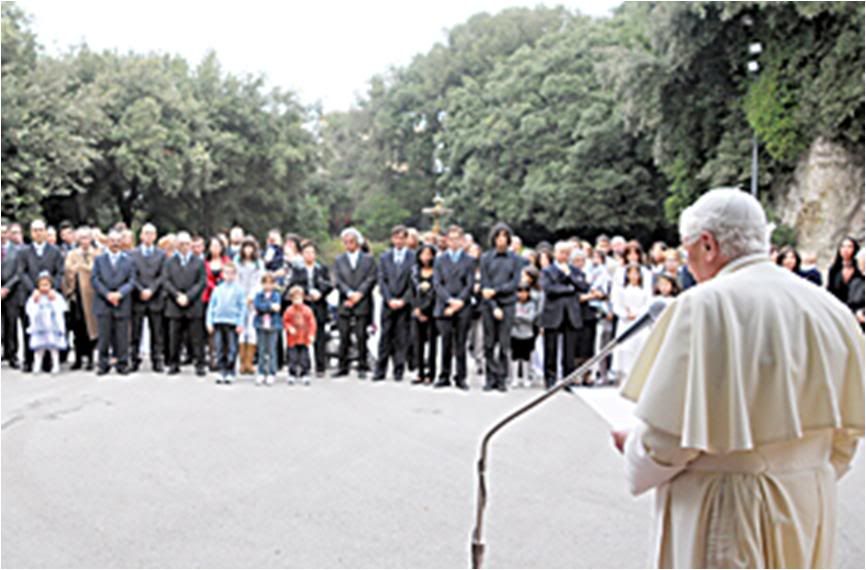
In the afternoon, the Holy Father said his farewell to the staff of the Pontifical Villas and their families.
Dear brothers and sisters,
Having come to the end of my stay at Castel Gandolfo this summer, I wish to renew to you my sincere gratitude for the valuable and diligent work that you carry out in the Pontifical Villas.
I greet first of all the director, Dott. Savero Petrillo, and I thank him for the courteous words he expressed in your behalf, as well as all his co-workers and all of you who form part of the work team in this 'appendage' of the Vatican.
In the past two months, I have personally experienced and noted the care and diligence with which you carry out your daily activities. I thank you all from the heart!
I extend my thanks to your families, who in some way participate in your service to the Holy See, accepting your having to be available on call, which can mean considerable absence from the family, especially during my residence here.
I ask the Lord to help you and those dear to you, filling you with his grace and accompanying you with his paternal love.
Today we celebrate the memory of St. Therese of the Infant Jesus, who is remembered by the Church primarily because she sensed and described the profound truth of Love as the center and heart of the Church, and lived this mystery intensely in her brief existence.
Precisely because of the centrality in her life of her relationship to Christ and her choice of love, and for the space that she reserved for affections and sentiments in her spiritual path, Therese of Liseiux is a very relevant saint, who is a singular model and guide for everyone, young people as well as adults.
I entrust you to her special protection so that you may carry out your work calmly and profitably. And may the Blessed Virgin, whom I invoke with trust, always watch over you and your families, while I assure you of remebrance in my prayers and I bless you all with affection.
[Modificato da TERESA BENEDETTA 03/10/2009 03:24] |
| |
 02/10/2009 10:21 02/10/2009 10:21 |
|
| | | OFFLINE | | Post: 18.538
Post: 1.191 | Registrato il: 28/08/2005
Registrato il: 20/01/2009 | Administratore | Utente Veteran | |
|
 Friday, Oct. 2
Friday, Oct. 2
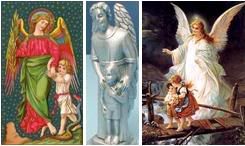 FEAST OF THE GUARDIAN ANGELS
FEAST OF THE GUARDIAN ANGELS
OR today.
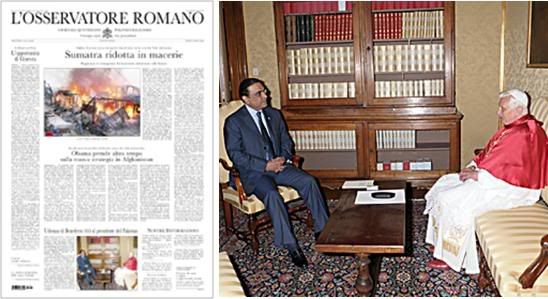
Papal stories in today's issue: The Holy Father meets with the President of Pakistan (photo) and says
farewell to authorities and service personnel in Castel Gandolfo - he returns to the Vatican Saturday from
the summer residence. Page 1 stories: Indonesia's Sumatra island and Samoa islands suffer earthquake/
tsunami consequences; multinational talks open in Geneva with Iran; and President Obama takes his time
on deciding new strategy for Afghan war.
THE POPE'S DAY
The Holy Father today received three new ambassadors who presented their credentials to the Holy See:
- H.E. Madame Mercedes Arrastia Tuason, from the Philippines
- H.E. Baroness Henriette Johanna Cornelia Maria van Lynden-Leijten, from the Netherlands
- H.E. Miguel Humberto Díaz, from the United States of America.
All addresses were in English.
He also met with
- Cardinal Giovanni Lajolo, President of the Pontifical Commission for Vatican City State and its Governatorate
- Mons. Orlando Antonini, Apostolic Nuncio to Serbia
- H.E. Raúl Roa Kourí, outgoing ambassador from Cuba, on farewell visit
- Cardinal Giovanni Battista Re, Prefect of the Congregation for Bishops
The Pope returns to the Vatican tomorrow morning after a two-month summer residence in Castel Gandolfo.
Pope reaches out to
Indonesian earthquake victims

The Vatican released the text of the Holy Father's condolences for the victims of the Sumatra earthquake:
MONS. LEOPOLDO GIRELLI
APOSTOLIC NUNCIO
INDONESIA
DEEPLY SADDENED TO LEARN OF THE RECENT DEVASTATING EARTHQUAKES AFFECTING INDONESIA, HIS HOLINESS POPE BENEDICT XVI PRAYS FOR THE VICTIMS AND THEIR GRIEVING FAMILIES, INVOKING ETERNAL REST UPON THE DECEASED AND DIVINE STRENGTH AND CONSOLATION ON ALL WHO ARE SUFFERING.
HIS HOLINESS LIKEWISE ENCOURAGES THE RESCUE WORKERS AND ALL INVOLVED IN PROVIDING EMERGENCY ASSISTANCE TO THE VICTIMS OF THIS DISASTER TO PERSEVERE IN THEIR EFFORTS TO BRING RELIEF, COMFORT AND SUPPORT
CARDINAL TARCISIO BERTONE
SECRETARY OF STATE
[Modificato da TERESA BENEDETTA 02/10/2009 13:47] |
| |
 02/10/2009 14:31 02/10/2009 14:31 |
|
| | | OFFLINE | | Post: 18.540
Post: 1.192 | Registrato il: 28/08/2005
Registrato il: 20/01/2009 | Administratore | Utente Veteran | |
|
 New US ambassador presents
New US ambassador presents
credentials to the Pope

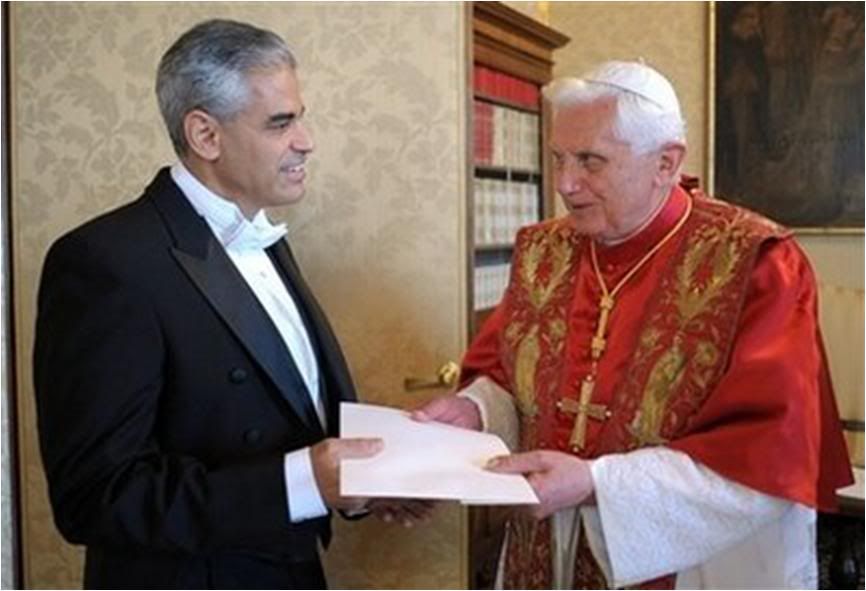
VATICAN CITY, Oct. 2 (AP) — Pope Benedict XVI says the Catholic Church in the U.S. will continue to try to shape consciences on issues such as abortion and euthanasia.
The Pope told Washington's new ambassador to the Vatican on Friday that he is confident both sides will keep cooperating in promoting human dignity and rights.
President Barack Obama chose Hispanic theology Professor Miguel H. Diaz as his envoy to the Holy See. Diaz, a Catholic, presented his credentials to Benedict and praised him for emphasizing "moral imperatives."
Benedict says the Church backs the right of U.S. health care workers to be conscientious objectors on right-to-life issues. U.S. bishops are among leaders of anti-abortion initiatives there.
How media 'shape the news' to suit their ends:
The headline given to the above piece was "Pope tells new US envoy Catholics can help debate on ethics, social issues; praises Obama" - but nowhere in the item are those words (nor their sense) used at all! In the full text of the Pope's address, the idea of helpful public debate is cited, yes, but not praise for President Obama!
Here is the full text of the Holy Father's address upon receiving Ambassador Diaz's credentials:
Your Excellency,
I am pleased to accept the Letters by which you are accredited Ambassador Extraordinary and Plenipotentiary of the United States of America.
I recall with pleasure my meeting with President Barack Obama and his family last July, and willingly reciprocate the kind greetings which you bring from him.
I also take this occasion to express my confidence that diplomatic relations between the United States and the Holy See, formally initiated twenty-five years ago, will continue to be marked by fruitful dialogue and cooperation in the promotion of human dignity, respect for fundamental human rights, and the service of justice, solidarity and peace within the whole human family.
In the course of my Pastoral Visit to your country last year I was pleased to encounter a vibrant democracy, committed to the service of the common good and shaped by a vision of equality and equal opportunity based on the God-given dignity and freedom of each human being.
That vision, enshrined in the nation’s founding documents, continues to inspire the growth of the United States as a cohesive yet pluralistic society constantly enriched by the gifts brought by new generations, including the many immigrants who continue to enhance and rejuvenate American society.
In recent months, the reaffirmation of this dialectic of tradition and originality, unity and diversity has recaptured the imagination of the world, many of whose peoples look to the American experience and its founding vision in their own search for viable models of accountable democracy and sound development in an increasingly interdependent and global society.
For this reason, I appreciate your acknowledgement of the need for a greater spirit of solidarity and multilateral engagement in approaching the urgent problems facing our planet.
The cultivation of the values of "life, liberty and the pursuit of happiness" can no longer be seen in predominantly individualistic or even national terms, but must rather be viewed from the higher perspective of the common good of the whole human family.
The continuing international economic crisis clearly calls for a revision of present political, economic and financial structures in the light of the ethical imperative of ensuring the integral development of all people.
What is needed, in effect, is a model of globalization inspired by an authentic humanism, in which the world’s peoples are seen not merely as neighbors but as brothers and sisters.
Multilateralism, for its part, should not be restricted to purely economic and political questions; rather, it should find expression in a resolve to address the whole spectrum of issues linked to the future of humanity and the promotion of human dignity, including secure access to food and water, basic health care, just policies governing commerce and immigration, particularly where families are concerned, climate control and care for the environment, and the elimination of the scourge of nuclear weapons.
With regard to the latter issue, I wish to express my satisfaction for the recent Meeting of the United Nations Security Council chaired by President Obama, which unanimously approved the resolution on atomic disarmament and set before the international community the goal of a world free of nuclear weapons. This is a promising sign on the eve of the Review Conference of the Treaty on the Non-Proliferation of Nuclear Weapons.
Genuine progress, as the Church’s social teaching insists, must be integral and humane; it cannot prescind from the truth about human beings and must always be directed to their authentic good. In a word, fidelity to man requires fidelity to the truth, which alone is the guarantee of freedom and real development.
For her part the Church in the United States wishes to contribute to the discussion of the weighty ethical and social questions shaping America’s future by proposing respectful and reasonable arguments grounded in the natural law and confirmed by the perspective of faith.
Religious vision and religious imagination do not straiten but enrich political and ethical discourse, and the religions, precisely because they deal with the ultimate destiny of every man and woman, are called to be a prophetic force for human liberation and development throughout the world, particularly in areas torn by hostility and conflict.
In my recent visit to the Holy Land I stressed the value of understanding and cooperation among the followers of the various religions in the service of peace, and so I note with appreciation your government’s desire to promote such cooperation as part of a broader dialogue between cultures and peoples.
Allow me, Mr. Ambassador, to reaffirm a conviction which I expressed at the outset of my Apostolic Journey to the United States. Freedom – the freedom which Americans rightly hold dear – "is not only a gift but also a summons to personal responsibility;" it is "a challenge held out to each generation, and it must constantly be won over to the cause of good" (Address at the White House, 16 April 2008).
The preservation of freedom is inseparably linked to respect for truth and the pursuit of authentic human flourishing. The crisis of our modern democracies calls for a renewed commitment to reasoned dialogue in the discernment of wise and just policies respectful of human nature and human dignity.
The Church in the United States contributes to this discernment particularly through the formation of consciences and her educational apostolate, by which she makes a significant and positive contribution to American civic life and public discourse.
Here I think particularly of the need for a clear discernment with regard to issues touching the protection of human dignity and respect for the inalienable right to life from the moment of conception to natural death, as well as the protection of the right to conscientious objection on the part of health care workers, and indeed all citizens.
The Church insists on the unbreakable link between an ethics of life and every other aspect of social ethics, for she is convinced that, in the prophetic words of the late Pope John Paul II, "a society lacks solid foundations when, on the one hand, it asserts values such as the dignity of the person, justice and peace, but then, on the other hand, radically acts to the contrary by allowing or tolerating a variety of ways in which human life is devalued and violated, especially where it is weak or marginalized" (Evangelium Vitae, 93; cf. Caritas in Veritate, 15).
Mr. Ambassador, as you undertake your new mission in the service of your country I offer you my good wishes and the promise of my prayers. Be assured that you may always count on the offices of the Holy See to assist and support you in the fulfillment of your duties. Upon you and your family, and upon all the beloved American people, I cordially invoke God’s blessings of wisdom, strength and peace.
About the new ambassador
Ambassador Díaz was born in Havana, Cuba, in 1963 to a working-class couple. His family moved to Spain and then to the United States when he was a child. He is married and has four children.
He is a Professor of Theology at the College of Saint Benedict and Saint John's University in Minnesota. He is co-editor of the book From the Heart of Our People: Explorations in Catholic Systematic Theology and author of On Being Human: U.S. Hispanic and Rahnerian Perspectives, named "Best Book of the Year" by the Hispanic Theological Initiative at Princeton Theological Seminary.
Ambassador Díaz has also taught Religious Studies and Theology at Barry University, the University of Dayton and the University of Notre Dame.
From 2001 to 2003, he taught and served as Academic Dean at St. Vincent de Paul Regional Seminary in Boynton Beach, Florida. He is a Board Member of the Catholic Theological Society of America (CTSA) and Past President of the Academy of Catholic Hispanic Theologians of the United States (ACHTUS). Dr. Díaz holds a B.A. from St. Thomas University and a M.A. and Ph.D. in Theology from the University of Notre Dame.
Besides English, he speaks Spanish, French and Italian. He reads Greek, Latin and German.
John Allen gets the obvious point in his report - and headline (it could be the NCR editor's headline, in which case, it is surprisingly objective:
Pope pushes Obama envoy
on abortion, conscience protection
by John L Allen Jr

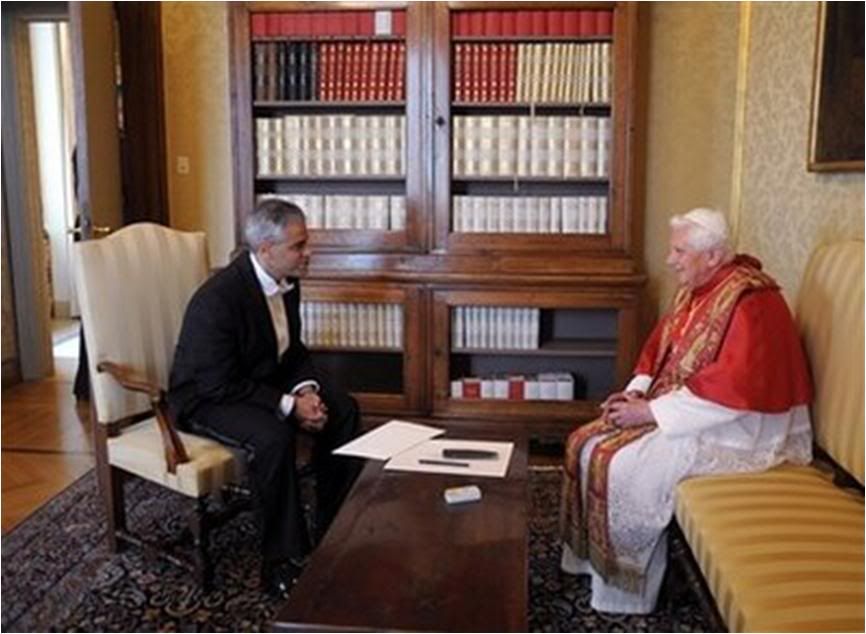
ROME, Oct. 2 - Miguel Diaz presented his credentials to Pope Benedict XVI this morning as President Barack Obama's ambassador to the Holy See, and the new envoy drew a pledge of cooperation on international issues from the Pope, as well as clear insistence upon "the inalienable right to life from the moment of conception to natural death," as well as "the right to conscientious object on the part of health care workers, and indeed all citizens."
Both abortion and the rights of conscience are important issues in the health care reform debate currently underway in the United States.
Obama has pledged to make any reform package "abortion neutral," but the Catholic bishops in the United States say that so far, none of the existing proposals meet that standard.
In more general terms, Benedict XVI said he looks forward to "fruitful dialogue and cooperation in the promotion of human dignity, respect for fundamental human rights, and the service of justice, solidarity and peace within the whole human family."
Diaz was nominated by Obama on June 18, confirmed by the U.S. Senate on August 4, and sworn in on August 21. A professor of theology at the University of St. John’s and the College of St. Benedict in Minnesota, Diaz is the first Hispanic to hold the ambassador’s position.
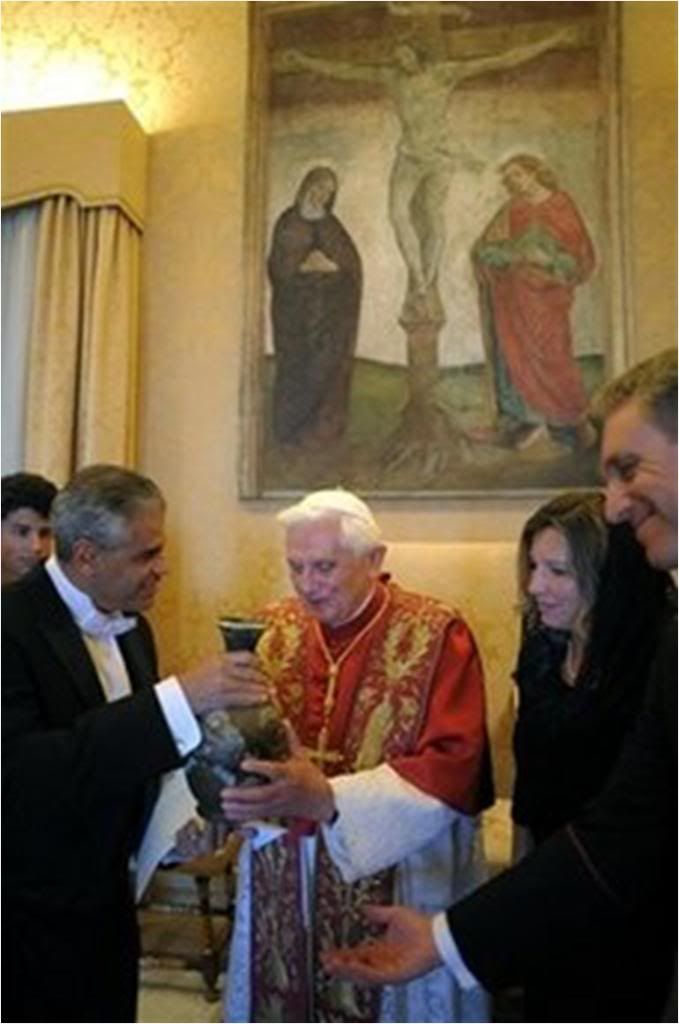 The text of Ambassador Diaz's presentation
The text of Ambassador Diaz's presentation
address, from the website of

Your Holiness,
It is a distinct honor to present to you my credentials as Ambassador Extraordinary and Plenipotentiary of the United States of America to the Holy See and to bring to you warm greetings from President Barack Obama and the American people.
I am very grateful to President Obama for the opportunity to represent him and my country to the Holy See. My wife and children, who have accompanied me to Rome, have also welcomed our President’s invitation to serve our country. They join me in offering our familial, cultural, and educational experiences at the service of diplomacy.
Your Holiness, I would like to begin by recalling your first meeting with President Obama. President Obama was deeply touched to meet with you and appreciated the opportunity to hear your perspective on many important issues. With his support, the U.S. mission to the Holy See looks forward to building upon twenty-five years of formal diplomatic relations.
Your Holiness, since the beginning of your pontificate, your encyclicals have further developed Catholic social teaching, defending the dignity of all persons and inviting the human family to embrace the power of love in order to overcome conflict and divisions. You have consistently argued that “the love of God is revealed in responsibility for others.”
Most recently, in Caritas in Veritate, you pointed out some critical areas that urgently require human responsibility and action. Your emphasis on moral imperatives is unique in the world.
You have called for inter-religious dialogue for the sake of peace, authentic stewardship of God’s creation in order to combat climate change and ensure food security, an ethical response to the financial crisis to mitigate its impact on the poor, and international cooperation to address issues related to the migration of peoples.
Your urgent priorities coincide with those set forth by President Obama, and as Ambassador of the United States I look forward to working with the Holy See to advance our common interests.
In his inaugural speech President Obama challenged Americans to assume new responsibilities at home and abroad, highlighting our common humanity. He invited the people of our nation to go beyond simple words, and to embrace bold actions to meet the demands of our times.
He has alluded often to the fact that the United States of America is a nation comprised of a great diversity of people, representing a number of religious traditions. Our nation has been shaped by every language and culture and has welcomed immigrants to its shores from every corner of this world.
Indeed, as the President has underscored, America has struggled for centuries to give meaning to the notion that all are created equal, and as Americans, we are dedicated to a simple principle: E pluribus unum — “Out of many, one.”
Your Holiness, in his groundbreaking speech in Cairo, President Obama reaffirmed his commitment to democracy and the need to turn interfaith dialogue into interfaith service so as to enable the building of bridges between people and to facilitate humanitarian actions.
He argued for the use of power through mutual consent, for respect of the rights of minorities, and for democratic participation to be carried out in the spirit of tolerance and compromise. Above all, President Obama reaffirmed that the one rule central to all religions is that “we do unto others as we would have them do unto us.”
The United States profoundly respects the Holy See as a sovereign entity, as a humanitarian actor, and as a unique moral voice in the world. The United States and the Holy See have partnered in the cause of noble objectives.
Together we have spread peace, supported religious freedom and other human rights, fostered democracy, denounced terrorism, addressed poverty and world hunger, prevented human trafficking, and combated the spread of HIV/AIDS and other terrible diseases.
The mission at the Holy See will soon host a conference with Caritas Internationalis on the prevention of mother-to-child transmission of HIV/AIDS. In the years ahead, we will continue to work with the Holy See and Vatican-affiliated organizations on similar initiatives.
In a special way, I wish to express my desire as ambassador to partner with the Holy See on issues related to interfaith, inter-racial, and intercultural conversations in order to advance the cause of peace and understanding among peoples.
Your Holiness, more than ever the United States realizes that we cannot act alone. Indeed, as you stated so eloquently in your most recent encyclical, “the development of peoples depends, above all, on a recognition that the human race is a single family working together in true communion, not simply a group of subjects who happen to live side by side.”
Reading this, I was reminded of candidate Obama who in his historic address in Berlin entitled “A World that Stands as One” stated: “The walls between old allies on either side of the Atlantic cannot stand. The walls between the countries with the most and those with the least cannot stand. The walls between races and tribes; natives and immigrants; Christians and Muslim and Jew cannot stand. These now are the walls we must tear down.” He went on to exhort people of good will everywhere that “now is the time to build bridges across the globe as strong as the one that bound us across the Atlantic.”
Your Holiness, my nation looks forward to working with the Holy See to ensure that the old and the young may embrace the audacity to hope, celebrate in the fruition of justice, and work together to defend fundamental human rights, economic opportunity for all, peace in our world, and respect for the dignity of all human persons.
As I take up my position as the ninth United States Ambassador to the Holy See, I promise to serve as a bridge-builder between the United States and the Holy See.
As a representative of President Obama and the great people of the United States of America, I have been entrusted with the responsibility of leading by listening to, and learning from, others. I accept this responsibility with joy and humility and will work to strengthen the indispensable relationship between the Holy See and the United States of America.
Thank you, Your Holiness.
I don't believe I have read a presentation speech by an ambassador that read,
more than anything else, like a hymn of praise to the nation's leader!
Compare it to Ambassador Mary Ann Glendon's presentation speech in February last year
vatican.usembassy.gov/viewer/article.asp?idSite=1&article=/file2008_02/alia/a802...
where she properly mentions President Bush only at the start of her address.
[Modificato da TERESA BENEDETTA 03/10/2009 03:28] |
| |
 02/10/2009 16:23 02/10/2009 16:23 |
|
| | | OFFLINE | | Post: 18.541
Post: 1.193 | Registrato il: 28/08/2005
Registrato il: 20/01/2009 | Administratore | Utente Veteran | |
|

 Pope names presidents
Pope names presidents
and secretaries of second special
Synodal assembly for Africa

Oct. 2, 2009
The Holy Father Benedict XVI has nominated the following Cardinals as President Delegates of the second Special Assembly for Africa of the Bishops' Synod:
- Francis ARINZE, Prefect Emeritus for the Congregation for Divine Worship and the Discipline of the Sacraments:
- Théodore-Adrien SARR, Archbishop of Dakar, Senegal, and
- Wilfrid Fox NAPIER, O.F.M., Archbishop of Durban, South Africa.
At the same time, His Holiness nominated two Special Secretaries: His Excellency Mons. António Damião FRANKLIN, Archbishop of Luanda, Angola, and His Excellency Mons. Edond DJITANGAR, Bishop of Sarh, Chad.
Pope Benedict opens
Special Synod assembly
on Africa this Sunday

VATICAN CITY, Oct. 2 (SIR) - "Being increasingly the salt of the earth and the light of the world is the grace that is obtained through prayer”. Because of this, “the celebration of the Synodal Assembly will be accompanied by intense moments of prayer”.
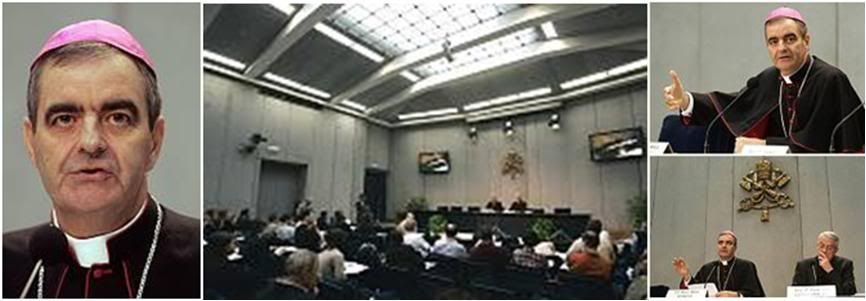
The “meaning and conduct” of the II Special Assembly for Africa of the Episcopal Synod (Vatican, 4-25 October) were explained by Mons. Nikola Eterovic, secretary general of the Synod, who briefed journalists at the Vatican today in advance of the assembly.
“Benedict XVI," said Mons. Eterovic, "will officiate at three Eucharistic celebrations in Saint Peter’s Basilica. In addition to the first one, on Sunday October 4th – which will have some African touch – and the final one at the end of the Synodal assembly on Sunday October 25th, the Pope will canonise 5 blessed souls on Sunday October 11th: Zygmunt Szczêsny Feliñski, Francisco Coll y Guitart, Josef Daamian de Veuster Rafael Arnáiz Barón, Marie de la Croix (Jeanne) Jugan. These saints effectively show how one becomes the salt of the earth and the light of the world”.
He also said that “a special event has been planned for the evening of October 10th”, when “the Pope will pray the Rosary with the university students of 9 African capitals: Cairo (Egypt), Antananarivo (Madagascar), Kinshasa (Democratic Republic of Congo), Nairobi (Kenya), Johannesburg (South-Africa), Maputo (Mozambique), Khartoun (Sudan), Onitsha (Nigeria) and Ouagadougou (Burkina Faso)”.
Earlier, the Secretary-General of the Bishops' Synod said that “the urgent need for evangelisation, which is closely connected with human promotion in the context of the African continent”, is the “priority” at the heart of special assembly's work on the theme “The Church in Africa at the Service of Reconciliation, Justice and Peace"
He said it is significant that the second special assembly for picks up the title of the post-Synodal apostolic Exhortation “Ecclesia in Africa”, John Paul II's summary of the First Special Assembly for Africa held in 1994.
That first Synodal Assembly for Africa “provided a general framework describing the situation of the Catholic Church on the continent”, explained Mgr Eteroviæ. “It also faced some challenges, ecclesial, social and political, many of which, unfortunately, are still topical”.
Starting from “this framework which is still valid, the Synodal Fathers, guided by Benedict XVI, want the second Special Assembly to be the place to discuss the mission of the Church at the service of reconciliation, justice and peace...These are fundamental issues for the present and future of the Catholic Church in Africa”.
In this “urgent task, the Church is ready to collaborate with other non-Christian religions as well as with all men of good will”. To this regard, concluded Mgr Eteroviæ,
There will be a 30-minute briefing on the reception of “Ecclesia in Africa” followed by a free debate on the subject on the first day of work for this assembly, he said.
More from Bishop Eterovic's briefing:
Facts and figures on
the Synodal Assembly
244 Synod Fathers will participate at the II Special Assembly for Africa, of whom 228 are bishops. These will take part in various roles: 79 will be taking part ex officio, 129 are elected and 36 are nominated by the Pontiff. Among these there are 33 cardinals, 75 archbishops, 120 bishops and 8 religious, elected by the Union of Superiors General.
As to their positions, there are 37 Presidents of Episcopal Conferences, 189 Ordinary Bishops, 4 coadjutors, 2 auxiliaries and 8 emeritus (arch)bishops.
With reference to Art. VII of the Ordo Synodi Episcoporum, the Holy Father Benedict XVI established that participating in the Synod of Bishops ex officio, along with the 25 department heads of the Roman Curia, there would also be all the African cardinals, presently 14, the Presidents of the Episcopal Conferences, national, regional and the international reunions.
In choosing the Synod Fathers the criterion followed was that of electing one bishop in five. In any case, an attempt was made to have at least one bishop from each of the 53 Africa countries.
The majority of the Synod Fathers, 197 of them, are from Africa. Another 47 come from other continents: 34 from Europe, 10 from America, 2 from Asia and 1 from Oceania.
Among these are the Presidents of the Episcopal Conferences from the other 4 continents who will address the Assembly at the start of its work. This fact will underline that the II Special Assembly for Africa concerns the whole Church.
As regards the work of the Synod, 20 General Congregations are foreseen along with 9 Sessions of the Circoli Minori, divided into the three official languages of the Synod: French, English and Portuguese. The Synod Fathers can also use Italian.
Four press officers will use these languages to regularly update journalists on the work of the Synod. The first press conference will take place on Monday October 5th. Card. Peter Kodwo Appiah TURKSON, Archbishop of Cape Coast, Ghana and the General Relator, will take part.
The full English translation of Mons. Eterovic's presentation at today's briefing, along with the calendar for the Synodal assembly can be found on
www.vatican.va/news_services/press/sinodo/documents/bollettino_23_ii_speciale-africa-2009/02_inglese/b02...
and has also been posted in the CHURCH&VATICAN thread
benedettoxviforum.freeforumzone.leonardo.it/discussione.aspx?idd=8593821&p=7&#idm...
[Modificato da TERESA BENEDETTA 04/10/2009 13:46] |
| |
 02/10/2009 18:26 02/10/2009 18:26 |
|
| | | OFFLINE | | Post: 18.545
Post: 1.197 | Registrato il: 28/08/2005
Registrato il: 20/01/2009 | Administratore | Utente Veteran | |
|
 NB: ZENIT has just published the original transcript of the interview given by Cardinal Dario Castrillon Hoyos to the Munich newspaper Sueddeutsche Zeitung last week, made available by the cardinal who noted that some of his statements were mistranslated in German.
NB: ZENIT has just published the original transcript of the interview given by Cardinal Dario Castrillon Hoyos to the Munich newspaper Sueddeutsche Zeitung last week, made available by the cardinal who noted that some of his statements were mistranslated in German.
In any case, the full interview deserves to be translated from the original Spanish, and as soon as I can, I will replace the translation first posted on this thread, which was based on the partial account in German from SD on line, and other parts, from the Italian translation of a Messainlatino reader from the paper issue of the newspaper.
[Modificato da TERESA BENEDETTA 02/10/2009 18:28] |
| |
 02/10/2009 23:46 02/10/2009 23:46 |
|
| | | OFFLINE | Post: 2.154
Post: 32 | Registrato il: 27/11/2005
Registrato il: 21/01/2009 | Utente Comunità | Utente Junior | |
|
Dear Teresa - The Mass on Sunday 4th October for the opening of the African Synod will definitely be shown on EWTN. Coverage starts at 8.30 am London time, 9.30 Rome time. It was announced several times between programmes today. I do hope friends in the USA and outposts such as Hawaii will be able to see it.
I love the new look Vatican website. It shows they are not prepared to continue with "the mixture as before", but to keep readers interested. I know we would have checked it every day, but we are exceptional!!!!!
![[SM=g7566]](https://im0.freeforumzone.it/up/0/66/3457662.gif) ![[SM=g7566]](https://im0.freeforumzone.it/up/0/66/3457662.gif) Thanks for the shoutout about EWTN, Mary! They have been quite conscientious about covering the Pope's 'special events', when they are religious pr pastoral, so I don't even have to check up their schedules (except when I need to catch a replay). I simply switch on EWTN when Vatican Radio starts a coverage, and they're there. Good thing, too, as I have been unable to get CTV for more than a year now. But I don't think EWTN will be covering the Oct. 8 concert, do you?
Thanks for the shoutout about EWTN, Mary! They have been quite conscientious about covering the Pope's 'special events', when they are religious pr pastoral, so I don't even have to check up their schedules (except when I need to catch a replay). I simply switch on EWTN when Vatican Radio starts a coverage, and they're there. Good thing, too, as I have been unable to get CTV for more than a year now. But I don't think EWTN will be covering the Oct. 8 concert, do you?
TERESA
[Modificato da TERESA BENEDETTA 03/10/2009 01:40] |
| |
 03/10/2009 02:43 03/10/2009 02:43 |
|
| | | OFFLINE | | Post: 18.546
Post: 1.199 | Registrato il: 28/08/2005
Registrato il: 20/01/2009 | Administratore | Utente Veteran | |
|
 Besides the new ambassador from the United States, two other new ambassadors presented their credentials to the Holy Father at Castel Gandolfo Friday ahead of him, both women, from the Philippines and from the Netherlands.
Besides the new ambassador from the United States, two other new ambassadors presented their credentials to the Holy Father at Castel Gandolfo Friday ahead of him, both women, from the Philippines and from the Netherlands.
In tomorrow's issue (10/3/09), L'Osservatore Romano, in reporting the credentialling ceremonies, along with the text of the papal addresses to each ambassador, describes the ritual followed with each of the new ambassadors. It is perhaps unlike any other similar protocol in the world:
When a new ambassador
presents his credentials...
Translated from
the 10/3/09 issue of

The Ambassador, picked up from her/his residence by one of the Gentlemen of His Holiness and an aide from the papal Antechamber, arrives at the Courtyard of the Pontifical Palace, where he/she receives honors from a contingent of the Swiss Guard.
Reveived by another one of the Gentlemen of His Holiness, the ambassador goes up to the second floor [third floor in Europe], where he/she is welocmed by the Aides of the Antechamber and the Sediari [members of the papal 'court' who used to be the chairbearers when the Pope still used the 'sedia'].
The cortege then proceeds to the Swiss Hall, where the new ambassador is welcomed by Archbishop James Harvey, Prefect of the Pontifical Household, who then accompanies him/her to the Hall of the Popes where he/she is presented to the Holy Father.
After the formal rpesentation of credentials, there follows an exchange of remarks, and then a private conversation between the Pope and the new ambassador.
At the end of the audence, the ambassador leaves the Pontifical Palace through the courtyard and proceeds to the Vatican for a meeting with the Cardinal Secretary of State Tarcisio Bertone.
Afterwards, the ambassador proceeds to St. Peter's Basilica, to be received by a delegation of the Basilica's canonical chapter, and makes a brief act of adoration in the Chapel of the Blessed Sacrament, then to veneerate an image of the Blessed Virgin Mary, before descending to the Tomb of St. Peter.
[Not mentioned, of course, is that throughout all this - except at the private audience with the Pope and the conversation with Cardinal Bertone - the new ambassador is accompanied by his/her family, sometimes including grandchildren, as was the case with the new ambassador from the Philippines, Madame Mercedes Arrastia Tuazon.]
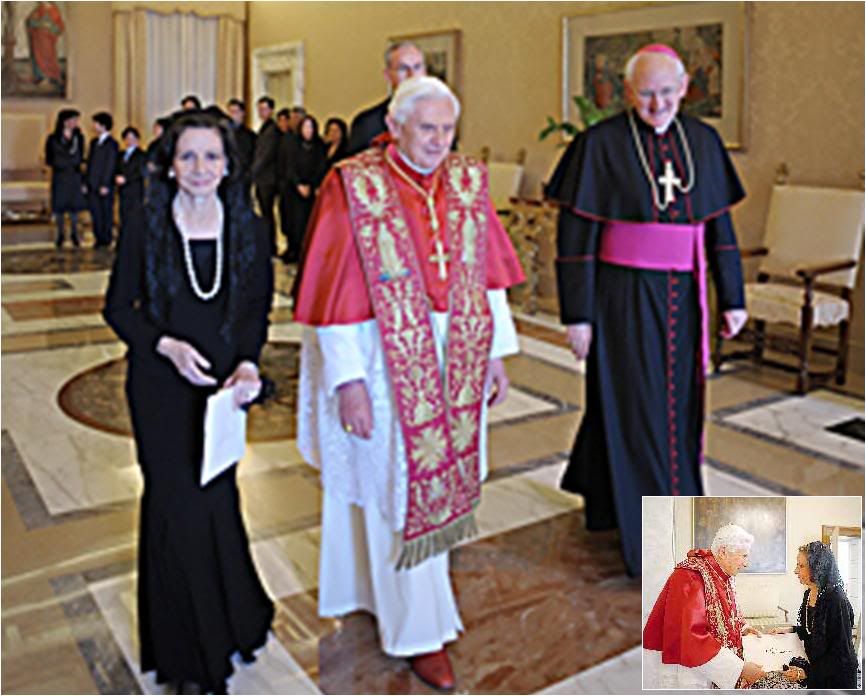
Here is the text of the Holy Father's address to Ambassador Tuazon:
Madam Ambassador,
Grateful for the kind words which you have addressed to me, I gladly accept the Letters of Credence accrediting you as Ambassador Extraordinary and Plenipotentiary of the Republic of the Philippines to the Holy See.
I would like to reciprocate the warm greetings which you have extended to me on behalf of Her Excellency, President Gloria Macapagal-Arroyo, and I would ask you to convey to her and to all the beloved Filipino people the assurance of my spiritual closeness and prayers, especially for the victims of Typhoon Ketsana.
For over half a century, the Holy See and the Philippines have maintained excellent diplomatic relations, strengthening their long-standing cooperation for the promotion of peace, human dignity and freedom. The spirit of good will which has brought us to this day will surely enkindle a fresh desire to work together so that justice and freedom go hand-in-hand, and that democratic principles be grounded in truth.
For her part, in the midst of the many changing social, economic and political conditions around the globe, the Church continues to hold out the Gospel as the path to authentic human progress (cf. Spe Salvi, 23). I am confident that the faith of the Filipino people - a faith, as Your Excellency has indicated, which gives them the "resilience" to face any hardship or difficulty - will arouse in them a desire to participate ever more fervently in the worldwide task of building up a civilization of love, the seed of which God has implanted in every people and every culture.
Your Excellency, I am pleased to note the various development initiatives under way in your country, including the modernization of irrigation systems, the improvement of public transportation and the reform of social assistance programs.
As the Philippines continues to implement these and other plans for a just and sustainable development, I am confident that she will draw upon all her resources - spiritual as well as material - so that her citizens may flourish in body and soul, knowing the goodness of God and living in solidarity with their neighbors.
Such programs, of course, are primarily aimed at improving the actual living conditions of the poorest, thus enabling them to fulfill their responsibilities towards their families and to carry out the duties which fall to them as members of the wider community.
Above all, the struggle against poverty calls for honesty, integrity and an unwavering fidelity to the principles of justice, especially on the part of those directly entrusted with the offices of governance and public administration.
In an age when the name of God is abused by certain groups, the "work of charity" (Caritas in Veritate, 57) is particularly urgent. This is especially true in regions that have been sadly scarred by conflicts. I encourage all to persevere so that peace may prevail.
As you have mentioned, Madam Ambassador, initiatives that aim at facilitating dialogue and cultural exchange are particularly effective, for peace can never come about merely as the product of a technical process engineered through legislative, judicial or economic means.
In the conviction that evil is only conquered with good (cf. Rom 12: 21), many in your country are taking courageous steps to bring people together in order to foster reconciliation and mutual understanding. I am thinking in particular of the commendable work of the Bishops- Ulama Conference (bBUC), the Mindanao People's Conference, as well as that of many grassroots organizations.
The Special Non-Aligned Movement Ministerial Meeting on Interfaith Dialogue and Cooperation for Peace and Development, which your country will host in December, also holds out the promise of advancing peace in Mindanao and throughout the world.
In closing, Madam Ambassador, I would like to take this opportunity to reassure the Filipino people of my affection and continued prayers for them.
I encourage them to allow their deep faith, their cultural heritage and the democratic values that have been a part of their patrimony from the time of their independence to shine as an example to all.
Extending a cordial welcome to you and to your distinguished family, I offer you my best wishes that your stay in Rome may be pleasant, and that the important mission entrusted to you may consolidate relations between the Holy See and the Republic of the Philippines, to the benefit of all.
Through the intercession of Our Lady of Truth, Justice and Holiness, may God bless the efforts of the authorities and citizens, so that your nation may walk the way of authentic human progress in an atmosphere of harmony and peace.
The Holy Father's remarks to the new ambassador from the Netherlands, Baroness Henriette Johanna Cornelia Maria van Lynden-Leijten, was perhaps the most incisive of his three addresses today. The Netherlands is not only highly secularized but has pioneered in legalizing euthanasia, assisted suicide and same-sex unions.
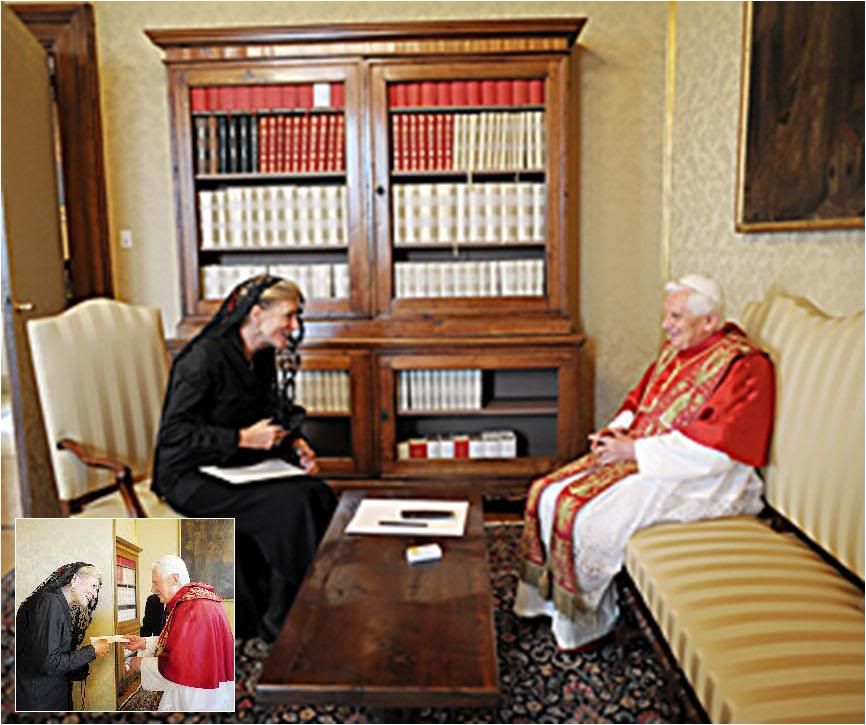
Your Excellency,
I am pleased to welcome you to the Vatican and to accept the Letters accrediting you as Ambassador Extraordinary and Plenipotentiary of the Kingdom of the Netherlands to the Holy See.
I would like to express my gratitude for the good wishes that you bring from Queen Beatrix. For my part, please convey to Her Majesty my cordial greetings and assure her of my continuing prayers for all the people of your nation.
In a world that is ever more closely interconnected, the Holy See's diplomatic relations with individual states afford many opportunities for cooperation on important global issues. In this light, the Holy See values its links with the Netherlands and looks forward to strengthening them further in years to come.
Your country, as a founder member of the European Economic Community and home to several international juridical institutions, has long been at the forefront of moves to strengthen international cooperation for the greater good of the human family.
Hence the mission on which you are about to embark is rich in opportunities for joint action to promote peace and prosperity in the light of the desire that both the Holy See and the Netherlands have, to help the human person.
The defence and promotion of freedom is a key element in humanitarian engagement of this kind, and it is one to which both the Holy See and the Kingdom of the Netherlands frequently draw attention. It must be understood, though, that freedom needs to be anchored in truth - the truth of the nature of the human person - and it needs to be directed towards the good of individuals and of society.
In the financial crisis of the past twelve months, the whole world has been able to observe the consequences of exaggerated individualism that tends to favour single-minded pursuit of perceived personal advantage to the exclusion of other goods.
There has been much reflection on the need for a sound ethical approach to the processes of economic and political integration, and more people are coming to recognize that globalization needs to be steered towards the goal of integral human development of individuals, communities and peoples - shaped not by mechanical or deterministic forces but by humanitarian values that are open to transcendence (cf. Caritas in Veritate, 42).
Our world needs to "reappropriate the true meaning of freedom, which is not an intoxication with total autonomy, but a response to the call of being" (ibid., 70). Hence the Holy See's conviction regarding the irreplaceable role of faith communities in public life and in public debate.
While some of the Dutch population would declare itself agnostic or even atheist, more than half of it professes Christianity, and the growing numbers of immigrants who follow other religious traditions make it more necessary than ever for civil authorities to acknowledge the place of religion in Dutch society.
An indication that your Government does so is the fact that faith schools receive state support in your country, and rightly so, since such institutions are called to make a significant contribution to mutual understanding and social cohesion by transmitting the values that are rooted in a transcendent vision of human dignity.
Even more basic than schools in this regard are families built on the foundation of a stable and fruitful marriage between a man and a woman.
Nothing can equal or replace the formative value of growing up in a secure family environment, learning to respect and foster the personal dignity of others, acquiring the capacity for "acceptance, encounter and dialogue, disinterested availability, generous service and deep solidarity" (Familiaris Consortio, 43; cf. Compendium of the Social Doctrine of the Church, 221) - in short, learning to love.
A society, on the other hand, which encourages alternative models of domestic life for the sake of a supposed diversity, is likely to store up social consequences that are not conducive to integral human development (cf. Caritas in Veritate, 44, 51).
The Catholic Church in your country is eager to play its part in supporting and promoting stable family life, as the Dutch Bishops' Conference stated in its recent document on the pastoral care of young people and the family.
It is my earnest hope that the Catholic contribution to ethical debate will be heard and heeded by all sectors of Dutch society, so that the noble culture that has distinguished your country for centuries may continue to be known for its solidarity with the poor and the vulnerable, its promotion of authentic freedom and its respect for the dignity and inestimable value of every human life.
Your Excellency, in offering my best wishes for the success of your mission, I would like to assure you that the various departments of the Roman Curia are ready to provide help and support in the fulfilment of your duties. Upon Your Excellency, your family and all the people of the Kingdom of the Netherlands, I cordially invoke God's abundant blessings.
NB: I used the photos of the actual credential presentation as small insets because of the extremely low pixel resolution of the original photographs lifted from the PDF of the OR front page tomorrow. Normally, these pictures are also posted in the OR's online summary as JPG images, but today, they are not. In fact, even these JPG images have lately been poorly resolved and do not lend themselves very well to enlarging. I do not understand why, in the digital age, the quality of the photos posted by the OR has shown appreciable deterioration in the past several weeks. This is noticeable even in the photos they release to the newsphoto agencies.
[Modificato da TERESA BENEDETTA 03/10/2009 11:54] |
| |
 03/10/2009 11:53 03/10/2009 11:53 |
|
| | | OFFLINE | | Post: 18.547
Post: 1.200 | Registrato il: 28/08/2005
Registrato il: 20/01/2009 | Administratore | Utente Veteran | |
|
 It is not often that one finds a member of Parliament, any Parliament, writing in praise of a Pope, any Pope. And a fairly young politician too. The writer, Luca Volonte (born 1966), a member of Comunione e Liberazione, has been a deputy in the Italian Parliament since 1996 as a member of the center-right Cristiani Democratici Uniti (CDU), formerly the People's Party, under Rocco Buttiglione.
It is not often that one finds a member of Parliament, any Parliament, writing in praise of a Pope, any Pope. And a fairly young politician too. The writer, Luca Volonte (born 1966), a member of Comunione e Liberazione, has been a deputy in the Italian Parliament since 1996 as a member of the center-right Cristiani Democratici Uniti (CDU), formerly the People's Party, under Rocco Buttiglione.
Thanks to Lella and her blog

for pointing out the item.
Polemics against the Pope
are a proof of his power:
He is our only Wall
against relativism
by Luca Volonte
Translated from

Oct. 3, 2009
Thomas Jefferson, who was not exactly the most pious of the American Founding Fathers, loved to admonish his fellow citizens about the distortions of freedom.
"The freedoms of a nation are assured when they come from their only true foundation - the conviction in the minds of men that these freedoms are a gift of God, and that they cannot be violated without incurring his ire".
Therefore, it is not just a Catholic problem, nor one of this particular Pope, to once more view the life of individuals and nations as if God existed. The entire Christian challenge, not only in the 20th century, starts from this point and is fought from it.
That is why the acrimony towards the recent trip of Benedict XVI to Prague, to the heart of Europe, both brings on a smile as well as some concern.
A smile because it is taken for granted that a Christian, especially a Catholic, would know he will be opposed when he proposes the Truth. And concern over the irresponsible obstinacy of so many who with their petty polemics wish to minimize, taint or obscure the concerns of every averagely prudent European citizen.
The careful tillers of bad weeds have not stopped instrumentalizing, deprecating and ridiculing the Catholic faith and any benevolent signs from Providence.
Thus we go from the ridiculous accusations of superstition by (Corrado) Augias [co-author of two anti-God, anti-Catholic bestsellers in italy] to the deprecable infamies on the Pope's presumed prior knowledge of Williamson's negationism, from the banal claim that the Pope has no listeners but 'four cats' to the silence about the hundreds of thousands of persons that the Pope has visited around the world.
But from the time of the Apostles, it has been so - "Our only strength is Christ". The Pope repeats this with extraordinary passion and continuity, not held back by the limitations of the persons and socieities he encounters, and tireless in repeating it on every occasion.
Every week, his brilliance amazes and fascinates, seizes and 'involves' us in the familiarity he has with God. We are all a bit 'dumb' - dumbed down by the schizophrenias of the world in which we are immersed, and we may find it difficult to retain the Pope's clear words, and so he lovingly reminds us, shakes us up, wakes us up.
With his Wednesday audience on St. Anselm of Aosta, Benedict started paving the way for his trip to the heart of Europe, with, among others, an appeal to believers to "Love the Church and do not abandon nor betray her!"
And it was not surprising that on the Friday before he left, he recalled the wounds and sufferings in children and therefore in the future of nations by the selfishness of broken families.
The petty polemics in the media that followed this was a sign not only that the Pope had spoken rightly from the point of view of the faith, but also on the scientific, psychological and statistical levels.
In his three days in the Czech Republic, Benedict laid bare the positive experiences of that nation and the other peoples of Europe who had been slaves of Soviet totalitarianism until 20 years go.
But at the same time, he unmasked once again, by citing authentic historical experience, the tyranny not just of atheism but of the present relativism - which is itself a terrible atheism that is simply based on self, what one might call egotheism.
He has not failed to follow through on his announcement of the struggle against the 'dictatorship of relativism' made just before he was elected Pope, and that is why, at the same time, he calls on the people to fidelity, to love of Christ, to the daily effort of conforming oneself to a conduct consistent with a Christian life.
In the struggle against the Soviet regimes, Havel, and before him, Berdaev, had carried out a concerned and careful scrutiny of the totalitarian consumerism of the West.
Then as now, 20 years after the fall of the Berlin Wall, the point on which to reflect and act is this: In the ailing societies of the West, only reopening man's horizons to God will allow human development that is integral and respectful of persons.
[Modificato da TERESA BENEDETTA 05/10/2009 17:57] |
| |
 03/10/2009 13:26 03/10/2009 13:26 |
|
| | | OFFLINE | | Post: 18.548
Post: 1.201 | Registrato il: 28/08/2005
Registrato il: 20/01/2009 | Administratore | Utente Veteran | |
|
 Saturday, Oct. 3
Saturday, Oct. 3
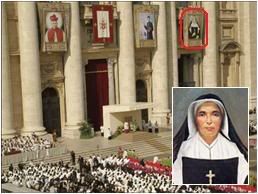 ST. MOTHER THEODORE (ANNE-THERESE) GUERIN
ST. MOTHER THEODORE (ANNE-THERESE) GUERIN
(France, 1798-Indiana, 1856)
Missionary and Founder, Sisters of Providence (USA)
Canonized by Benedict XVI on 10/16/2006
OR today.
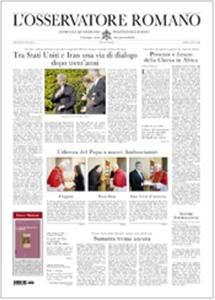
 Papal stories in this issue: New ambassadors from the Philippines, Netherlands and the USA present their credentials, and the Pope's farewell to the staff of the Pontifical Villas. Other Page 1 stories: An essay on the present and future of the Church in Africa preparatory to the opening of the Bishops Synod's Second Special Assembly for Africa on Sunday; first direct talks between the US and Iran after 30 years; and afterquakes in Sumatra where at least 5000 people are feared dead in the initial shock.
Papal stories in this issue: New ambassadors from the Philippines, Netherlands and the USA present their credentials, and the Pope's farewell to the staff of the Pontifical Villas. Other Page 1 stories: An essay on the present and future of the Church in Africa preparatory to the opening of the Bishops Synod's Second Special Assembly for Africa on Sunday; first direct talks between the US and Iran after 30 years; and afterquakes in Sumatra where at least 5000 people are feared dead in the initial shock.
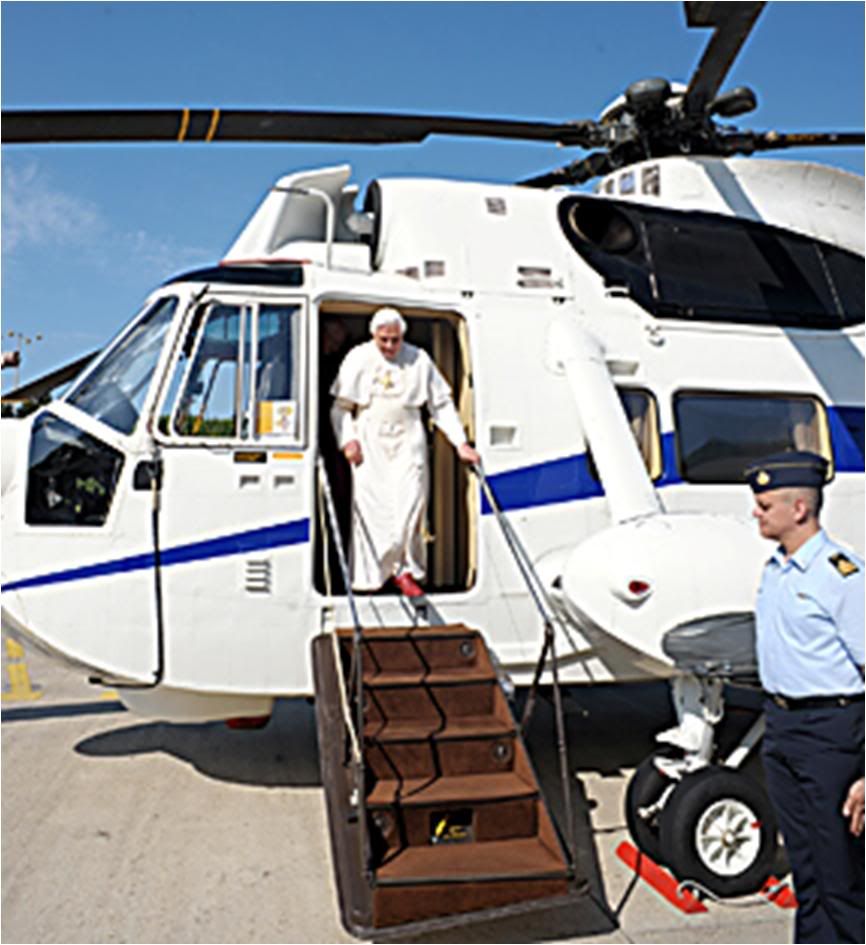
The Holy Father returned to the Vatican today after his two-month summer residence in Castel Gandolfo.
No scheduled events announced.
REMINDER
 Sunday, Oct. 4
Sunday, Oct. 4
XXVII Sunday "per annum"
09:30 St. Peter's Basilica
Cappella Papale
OPENING OF THE II SPECIAL ASSEMBLY FOR AFRICA
OF THE BISHOPS' SYNOD
The Vatican announced that the Holy Father has named Cardinal Jozef Tomko, emeritus prefect of the Congregation
for the Evangelization of Peoples, as his personal representative to the concluding ceremonies of the 150th
anniversary of the evangelization of Taiwan on November 22.
[Modificato da TERESA BENEDETTA 04/10/2009 02:44] |
| |
 03/10/2009 14:42 03/10/2009 14:42 |
|
| | | OFFLINE | | Post: 18.549
Post: 1.202 | Registrato il: 28/08/2005
Registrato il: 20/01/2009 | Administratore | Utente Veteran | |
|
 I did not realize how deep-seated anti-Catholicism continues to be among some Protestants. Su much for ecumenism....
Evangelical Protestants
I did not realize how deep-seated anti-Catholicism continues to be among some Protestants. Su much for ecumenism....
Evangelical Protestants
oppose Pope's visit
by WILLIAM CRAWLEY

Friday, 2 October 2009
The Evangelical Protestant Society has issued the following statement, making clear their opposition to any visit to Northern Ireland (and presumably Great Britain as well) by Pope Benedict or his successors:
We fully support the statement issued by DUP MLA Ian McCrea in opposition to any visit by the Pope to Northern Ireland. We commend Mr McCrea for his courageous and principled stand and urge all Protestant politicians to follow his lead.
Whether the Pope comes to Ulster next year, or the visit is deferred to 2012, now is the time to galvanise opposition to any such visit, and it is incumbent upon all Protestant leaders, in church and state, to nail their colours to the mast.
As evangelical Protestants, we believe in civil and religious liberty for all, and we accept that a religious leader has the right to pay a pastoral visit to his flock. But the Pope is no ordinary religious leader, and his visit cannot be merely pastoral.
Indeed, the planned visit to Great Britain will be the first state visit by a pope since the Reformation.
The Pope makes very significant spiritual and temporal claims about himself and his Church. The Pope of Rome arrogates to himself power over princes and kings and claims to be Vicar (or substitute) of the Lord Jesus Christ.
[I cannot imagine a more bigoted statement from any Protestant group in recent times - it harks back to the vicious anti-Papist days that followed Henry VIII's departure from the Church after the Pope rejected his divorce and remarriage. But it gets worse...]
[IMG]This statement was issued by Wallace Thomson, EPS's secretary, who is also a former DUP special advisor. Wallace Thompson will join me live on Sunday morning to talk about the concerns he has raised.
Protestants from the days of the Reformation onwards have identified the Pope as the Antichrist, and this doctrinal position is enshrined in, for example, the Westminster Confession of Faith.
This is the position held by Ian McCrea, and it is the position held by the Evangelical Protestant Society as an inter-denominational organisation.
We therefore utterly reject the accusation by SDLP MLA Patsy McGlone that Ian McCrea's comments were sectarian. Of course the Church of Rome regards any opposition to her teachings or her claims as "sectarian", so we should not be surprised by Mr McGlone's remarks.
Meanwhile, we in EPS will be doing all we can to co-ordinate united Protestant opposition to any papal visit, and we will work closely with Protestants not only in Northern Ireland but across the United Kingdom.
In a homily last Sunday, marking the anniversary of Pope John Paul II's visit in 1979, Cardinal Sean Brady said:
"My message is one of peace and love. May no Irish Protestant think that the Pope is an enemy, a danger or threat. My desire is that instead Protestants would see in me a friend and a brother in Christ".
Again it is timely to recall those words in a week when some here have tried to drum up opposition to a possible Papal visit.
"Let history record," Cardinal Brady concluded: "That at a difficult moment in the experience of the people of Ireland, the Bishop of Rome set foot in your land, that he was with you and prayed with you for peace and reconciliation for the victory of justice and love over hatred and violence".
Benedict’s trip to Britain:
New details emerge
By Ed West

2 October 2009
Pope Benedict XVI will visit Britain next September in the first-ever papal state visit to the country.
It will be the first papal visit to Britain since 1982 when Pope John Paul II's pastoral six-day tour drew huge crowds, and the first state visit of a pontiff by government invitation. [I wonder why John Paul II's visit was not a state visit as well!]
Prime Minister Gordon Brown re-issued a formal invitation during a private audience in February.
A spokesman for Mr Brown said he was "delighted" and that "it would be a moving and momentous occasion for the whole country".
It has been suggested that the Pope will be present at the beatification of Cardinal John Henry Newman. Church sources say London, Birmingham and Edinburgh would be likely destinations, as well as Oxford.
Archbishop Vincent Nichols of Westminster, president of the Bishops' Conference of England and Wales, said the "prospect of a visit by Pope Benedict fills us with joy".
"We are glad the Holy Father is giving such consideration to the invitations he has received from Her Majesty's Government, which accord closely to the wishes and requests also expressed by the Bishops of England and Wales," he said.
A spokesman for Mr Brown said: "The PM is obviously delighted at the prospect of a visit from Pope Benedict XVI to Britain. It would be a moving and momentous occasion for the whole country and he would undoubtedly receive the warmest of welcomes."
Conservative leader David Cameron, tipped to be Prime Minister when the papal visit comes around, said he was also "delighted" to hear of the visit.
He said: "Such a visit - the first in over a quarter of a century - would be greatly welcomed not only by Roman Catholics but by the country as a whole."
The Archbishop of Canterbury, Dr Rowan Williams, added that he had long hoped for such a visit.
"I'm sure I speak on behalf of Anglicans throughout Britain, in assuring him that he would be received with great warmth and joy," he said.
Tony Blair invited Pope Benedict to Britain when he visited the Vatican in June 2006, and repeated the invitation a year later. The English bishops also sent the Holy Father a formal invitation that year. Earlier this year Mr Brown renewed the invitation, which was "warmly received", according to the BBC.
An official announcement about the date will be made at the end of the year but it is expected that the visit will be in September, which by convention is the time of year Pope Benedict makes a visit to a European country.
In previous Septembers he has visited Germany, Austria and France, and he has just completed a visit to the Czech Republic. The trip is expected to last three days, although it could be as long as five. The Vatican may not formally announce the trip until December.
The Pontiff will confine his trip to Great Britain and will not visit Northern Ireland until 2012, despite some media speculation, when he visits the Irish Republic for the International Eucharistic Congress.
Some Catholics are hoping the Pope will break with convention and beatify Cardinal Newman himself.
Fr Federico Lombardi, the Pope's spokesman, said such a trip would be an "obvious occasion" to beatify Cardinal Newman. A journalist in the Czech Republic noted that Benedict XVI had previously expressed a preference to allow beatifications to be carried out by the local Church rather than by the Pope. In response, Fr Lombardi said: "We have a year to figure that out."
A Church insider said: "Cardinal Newman is the major event. It wouldn't be ridiculous to suggest that it's a possibility. The Pope has said it's his rule not to preside at beatifications but it's his rule to break.
"Pope Benedict is a great admirer of Newman and this visit is about Newman, and about what it says about the Church. It's not as simple as him turning up to bash politicians on the head. He always comes to boost those countries he visits, and England and Wales will benefit."
Catholic journalist Peter Jennings said he believed that the Pope would beatify Newman at an open-air Mass during a state visit in September.
Speaking from Rome after meeting senior Vatican officials, he said: "Wouldn't it be fantastic if the Pope also declared Newman a Doctor of the Church during the same ceremony?"
Earlier this year the Pope approved as a miracle the cure of a Massachusetts deacon from a crippling spinal condition, bringing Cardinal Newman, who died in 1890, one step closer to canonisation. Jack Sullivan, who will visit Britain next month, said he was healed after praying to Cardinal Newman in 2001, after watching a documentary on EWTN.
The Pope's visit was not universally welcomed, however.
Terry Sanderson of the National Secular Society, said: "This is dismal news indeed. Why Britain should seek to laud such a nasty extremist is beyond me."
[Modificato da TERESA BENEDETTA 03/10/2009 16:34] |
| |
 03/10/2009 15:41 03/10/2009 15:41 |
|
| | | OFFLINE | | Post: 18.550
Post: 1.203 | Registrato il: 28/08/2005
Registrato il: 20/01/2009 | Administratore | Utente Veteran | |
|
 First off, this is one of those infuriatingly ex-cathedra and not well-founded articles that John Allen is occasionally capable of.
First off, this is one of those infuriatingly ex-cathedra and not well-founded articles that John Allen is occasionally capable of.
I beg to disagree most strongly with his main thesis in this column. If only because the Pope, any Pope - especially in the age of the Internet - can never be just an Italian story.
One swallow does not a summer make - and while there may be some truth to the relative lack of interest by most especially the Anglophone press in covering Benedict XVI, so far it really applies only to the so-called mainstream media. Which as some American commentators have pointed out is increasingly fringe rather than mainstream - the once 'great' names of journalism whose newspaper readership and TV audience has been steadily dwindling because Americans are seeing through their shameless liberal bias.
Mr. Allen may entertain the conceit that he was virtually the only Anglophone correspondent covering the trip, but AP, Reuters and AFP did file all the reports and newsphotos that they should have filed, and upon which the rest of the world generally relies for reportage since very few can afford to assign dedicated Vatican correspondents! And as conscientious a reporter as Allen generally is, the readership of his magazine is nonetheless insignificant compared to the worldwide syndication of the news agencies.
The news service coverage of the Czech trip was par for the course - neither any worse or less objective or less comprehensive than the tendentious reports filed by the New York Times, for example - which, by the way did have a correspondent reporting directly from the Czech Republic.
The Pope has become
an Italian story

Oct. 2, 2009
Rome -- At one point during Pope Benedict XVI's trip to the Czech Republic last weekend, I strolled across the press center in the Prague Hilton. Taking in the conversations floating through the air, and gazing at the people in the room, I was struck by this insight: The Pope has once again become largely an Italian story. [Again, I must remark: A false insight!]
Pope John Paul II was a global newsmaker, and the press corps that followed him was strikingly international. These days, the non-Italians who regularly travel with the Pope have dwindled to the media equivalent of a remnant church.
[Has Allen not thought that this happenstance coincided with the start of the worldwide financial crisis? He himself wrote a long column last March about how media outfits could not afford to send a correspondent travelling wit the Pope to Cameroon and Angola because of the cost of the roundtrip tickets. In any case, travelling with the Pope does not necessarily guarantee better or more comprehensive reportage!]
On this trip, there was no one from The New York Times, the Los Angeles Times, or CNN (unless you count me, but my phone never rang), all of whom used to be regulars. [From what I recall of media names in the published passenger manifestos of those travelling with Pope Benedict, the New York Times and the Los Angeles Times never did, to begin with. As for CNN, it has long been decisively dislodged from cable news dominance by Fox.]
Fox was on the papal plane, but only because their Rome correspondent is invested in the Vatican story; if he weren't around, it's a good bet Fox wouldn't be in the mix either. [Come again???]
To be sure, those agencies have a presence in Prague, so it's not like they blew off the story. But once upon a time, all would have had a correspondent moving with the papal party and filing daily coverage. At that level, the American presence boiled down to the Associated Press, a producer from ABC, and the Catholic News Service. (I made the trip, but not on the plane.)
Probably the lone thing that people who get their news from American TV know about the trip is that at one point a spider crawled across the pope's garments. That clip has become popular on You-Tube, and of course it doesn't require any reporting or analysis to understand.
[If they watch Fox like I do, they will know that Fox reported the Pope's trip regularly on their regular news breaks, even carrying some moments live - parts of the Masses and his arrival and departure speeches. And the daily Yahoo summary of newspapers using the wire service stories was not less than on other trips - if you don't count extraneous reporting like AIDS and condoms, or sex offender priests, in previous trips.]
Two points probably help explain this lack of global interest.
First, Benedict XVI simply isn't the charismatic figure John Paul II was. [HO-HUM AND HO-HUM AGAIN!!!]
Second, Benedict has surrounded himself with Italians who sometimes seem more interested in il bel paese than the global scene. Cardinal Tarcisio Bertone, the Secretary of State, regularly injects himself into Italian affairs.
The best sound-bites [???? - Only because controversial and instantly instrumentalized to be used against the Church] from the Holy See usually come, in Italian, from prelates such as Archbishop Salvatore Fisichella, president of the Pontifical Academy for Life, and Archbishop Agostino Marchetto, secretary of the Pontifical Council for the Pastoral Care of Migrants and Itinerant Peoples.
[Excuse me, Mr. Allen - are you REALLY saying that statements by Benedict XVI reported in the media are second-best to the egoistic pronouncements of some Curial prelates???? It infuriates me that sometimes Allen can be so cocksure of his 'insights' that he plunges headlong into them even when it is clear he has not really thought through his statements and their implications!!!]
In many ways, this is more a return to historical form than a novelty. Prior to John Paul II, most Popes were figures of occasional interest around the world; only in Italy were they everyday headliners.
[Can anyone really say that of any Pope from Pius XII onwards? If the interest was 'occasional', it was also exceptional! John XXIII, who called Vatican II?? Paul VI, who executed Vatican II, became the first modern pilgrim Pope, and shook the modern world with Humanae Vitae?]
No Pope is an everyday headliner anywhere, not even in Italy - and not even John Paul II, who made news when he travelled, and for dramatic and unprecedented events like a near-successful assassination attempt and all the mea culpas on behalf of the Church, but hardly ever for his daily Magisterium, it pains one to say].
Rather than being an exception, Benedict XVI is more like the norm -- and hence a reminder of just how remarkable John Paul actually was. {Being that Benedict XVI is not remarkable at all, in more ways than one, including the fact that he attracts more crowds than his late great predecessor??? It takes quite a lot of chutzpah to imply in any way that Benedict XVI has not been a remarkably remarkable Pope, and I resent it deeply on behalf of all those who love and admire him! Why is Allen descending once again to the invidious comparison game? The Catholic Church is great enough to have great Popes in succession. Greatness is no one's monopoly.]
Nonetheless, this reversion to the papacy as essentially an Italian news beat carries two dangers. [Again, I must insist - IMHO, that's a decidedly fallacious conclusion.]
First, it tempts Italians to interpret almost everything the Pope says or does as a veiled commentary on Italian affairs. A comic moment in the Czech Republic came near the end, when Benedict XVI made a generic reference to the need for public officials to respect moral values.
That triggered a debate among Italian correspondents about whether this was a criticism of Italian Prime Minister Silvio Berlusconi, who celebrated his 73rd birthday this week. Berlusconi's alleged escapades with young courtesans fueled a juicy bit of summer theater here.
[And as the rest of the world generally does not get to learn what Italian media report and how they report it, what does that have to do with anything outside Italy???]
The second risk, more relevant for people outside Italy, is that international understanding of the papacy is ever more dependent upon Italian coverage. As I've said before, depending upon the Italians is a dangerous proposition.
[Why? How? And who depends exclusively on the Italians, anyway? Anglophone media, for instance, hardly ever report what the Italian media say about the Pope and the Vatican unless the story involves a scandal or one of the social-issue buzzwords that media feed upon!
Fortunately, no one ever has to depend these days on what the media report or choose to report, because the original sources are now available in real time on the Internet. I don't have to read John Allen to tell me what the Pope said. I can read it directly, or listen to it or watch it even!]
To be sure, Italian journalism has its strengths. It's more art than craft, so correspondents are encouraged to bring their personalities into the coverage. That often makes their essays provocative and highly original.
A concern for factual accuracy, however, does not figure prominently among its virtues. [WHAT A HOOT! As if a concern for factual accuracy figures among the virtues of journalism outside Italy!!!! Allen himself, as I have had occasion to point out whenever he does it, has reported wrong data, including readily verifiable ones, like dates and timelines.] Sometimes speculation or hypotheses run on the news pages, without much indication that they're not to be taken seriously.
Of course, Italians know all that, and they're highly sophisticated about reading between the lines. When this speculation is translated into other languages and taken as real news, however, it can cause a great deal of mischief -- especially, perhaps, in Anglo-Saxon cultures, where we're still at least somewhat inclined to assume that what appears on the news pages is factually true.
[Where do you live, John Allen? Italians are no more sophisticated about the media than the regular man on the street anywhere in the world. Americans perhaps are beginning to wake up about the whole house of cards that printed media is, but most of the time, people still tend to believe that anything printed confers some legitimacy on whatever is reported.]
If the Italian near-monopoly on Vatican coverage [in your mind!] gains strength, therefore, more and more the rule for understanding news about the Pope will have to be caveat lector: "Let the reader beware."
[And that caveat holds for anything anyone ever reads or hears in the media, John Allen included.]
[Modificato da TERESA BENEDETTA 05/10/2009 17:53] |
| |
 03/10/2009 20:43 03/10/2009 20:43 |
|
| | | OFFLINE | | Post: 18.553
Post: 1.206 | Registrato il: 28/08/2005
Registrato il: 20/01/2009 | Administratore | Utente Veteran | |
|
 Cardinal Bagnasco tackles
Cardinal Bagnasco tackles
media reporting on the Pope
From the site of the CEEE
Oct. 3, 2009
PARIS - Cardinal Angelo Bagnasco, Archbishop of Genoa and president of the Italian bishops' conference (CEI), today addressed the current Plenary Assembly of the Council of Bishops’ Conferences of Europe (CCEE) under way in Paris Oct. 1-4, at the Maison de la Conférence des évêques de France, and spoke on the Pope and the media.
The session's main theme is "Church and State, 20 years after the fall of the Berlin Wall".
With a view to identify various models and juridical solutions to be adopted by individual European States in order to attribute a legal status to the Catholic Church and regulate relations with Her and Her main pastoral, social and educational structures, CCEE has
promoted a Europe-wide research.
This is aimed at addressing various issues, such as:
- What is the Catholic Church’s juridical status in the European States?
- Which laws and concordats have been abolished so far?
- How are the Church’s charitable institutions (schools, hospitals, etc.) funded?
- What is the influence at local level of the various laws, treaties and agreements within the European institutions?
- And what are the communitarian aspects of religion?
The results of this European survey were to be presented to the Presidents of the Bishops’ Conferences of Europe in attendance.
The CEEE gathers the Presidents of the current 33 European Bishops’ Conferences of this Continent, and the Archbishops of Luxembourg and of the Principality of Monaco, as well as the Bishop of Chisinău (Moldavia).
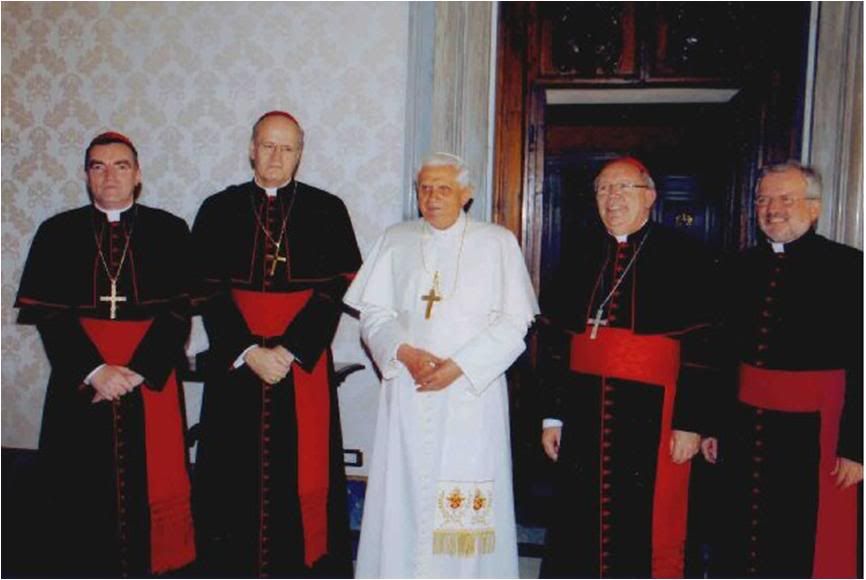 CCEE officers with Pope Benedict XVI in April 2007.
CCEE officers with Pope Benedict XVI in April 2007.
Current President is Cardinal Péter Erdö, Archbishop of Esztergom-Budapest, Primate of Hungary; the Vice-Presidents are Cardinal Josip Bosanic, Archbishop of Zagreb, and Cardinal Jean-Pierre Ricard, Archbishop of Bordeaux. The General Secretary of CCEE is Fr Duarte da Cunha. The headquarters of the Secretariat is in St Gallen (Switzerland).
Here is the English translation of Cardinal Bagnasco's text provided by the CCEE:
THE MEDIA AND THE POPE:
A DIFFICULT YEAR
by Cardinal Angelo Bagnasco
Arcbishop of Genova
President, Conferenza Episcopale Italiana
I would like to begin by greeting and thanking His Eminence the Cardinal President and all my confrères in the Episcopate for the invitation to talk about this significant theme: “The Media and the Pope: a difficult year”.
It is a complex and very relevant theme, considering the importance assumed by the means of social communication in today’s globalised society and the risks connected to the distorted use of them, above all today when, “communication seems increasingly to claim not simply to represent reality, but to determine it, owing to the power and force of suggestion that it possesses” (Benedict XVI, Message for the 42nd World Communications Day, 24 January 2008).
On the basis of analysis of the Italian experience, which in many aspects offers a privileged point of view, it can be said that in the early period the media representation of Benedict XVI’s pontificate was on the whole reasonable and largely positive.
The uncertainties of some commentators, tied to the most part to the projection onto the new Pontiff of not-wholly positive stereotypes linked to Cardinal Ratzinger or to his presumed lack of communication skills, were very soon overcome or at any rate reappraised by a more careful judgement about the content of the teaching, and recognition of the particular appeal exercised by the Pope over crowds despite his deliberately restrained style, focussed on the word more than his gestures.
This appeal was nurtured by some major events which stood out from a media point of view, such as for example the visit to the synagogue in Cologne, during his first trip to Germany, on 19 August 2005; or the visit to the Auschwitz–Birkenau concentration camp, on the occasion of his trip to Poland, 28 May 2006; or again the visit to the Blue Mosque in Istanbul, during the visit to Turkey, 30 November 2006; or, finally, the lectio magistralis at Regensburg University on 12 September 2006.
Besides these events which had a notable impact, media attention has been catalysed by Benedict XVI’s interventions on so-called “non-negotiable principles” or the Christian roots of Europe, which have caused a lively debate in public opinion in the major European nations.
Less attention, instead, has been devoted to some meetings rich in significance for the ordinary life of the Church, such as the visits to Rome parishes, speeches to groups and the Wednesday catecheses, which in reality often represent the opportunity for preaching and testimony on the part of the Pope which should merit much greater emphasis and examination.
One detects here the risk, which already emerged in the second year of the pontificate and gradually intensified, of a disparaging media representation, which tends to undervalue the Pope as witness and preacher of the Gospel and over-emphasise the intellectual and political Pope, to stress the interventions believed to be potentially confrontational, judged to be more useful for making news, and to ignore some basic themes which reveal the priorities of the Pontificate.
These well-known priorities can be quickly called to mind.
The first is represented by God himself, by the relationship with Him and by faith in Him through the Lord Jesus Christ who has revealed him to us.
In this perspective one call also speak of a “Christological” priority, shown in particular in the book Jesus of Nazareth, which drives Benedict XVI to reassert strongly that Jesus Christ is the way to God the Father, our unique Saviour, the true substance of Christian faith.
The Church must make God present in this world and offer people access to God. This mission is realised above all through personal and liturgical prayer, and demands that at heart is the unity of believers: these, prayer and the unity of believers, are further priorities of the current pontificate which involve everyone, each with their own responsibility.
A final priority which it seems appropriate to recall here concerns the clarification of an authentic concept of freedom, necessary for the life of people and the good of society.
To this end Benedict XVI, rejecting every ethic and idea concerning what has been defined as a “dictatorship of relativism”, emphasises that the freedom of the person is by its nature relational and cannot exclude responsibility towards the other person.
Freedom is such, one can say, only in relation to the inaccessible value of each life, of peace, justice, solidarity and all the fundamental human goods appreciation and respect of which needs, however, further education.
If one ignores or neglects this framework of priorities in which the Pontiff’s various interventions are situated, it is difficult to avoid partial or misleading representations, ideological and preconceived criticism, readings aimed at making the Pope say what in all evidence he does not say, even going so far as to nurture forms of ostracism foreign to democratic dialectic.
Some recent discussions fall into this type of media shift, as for example those following the famous Regensburg address, the Motu proprio allowing celebration of the pre-Conciliar liturgy, or the remission of the excommunication of four Lefebvrian bishops, or the clarifications about the nature of inter-religious dialogue, or considerations about limitations of the use of condoms which arose during the trip to Africa.
In all these cases, a correct representation would have enabled the misunderstandings to be overcome and allowed for the clarification of the effective importance of interventions which, far from justifying certain of the severe criticisms that were made, in fact coherently develop some of the key ideas of the pontificate and the priorities indicated above.
Instead, there was a preference for a partial and rather often frankly mistaken reading, which leads oneself to ask if in some elements of culture and the means of communication an anti-clericalism interested in hiding the true face of the Church and distorting the significance of her message is making headway, so that the message appears to be incoherent and anachronistic and the Church seems animated solely by the desire to “build walls and dig trenches”, especially in ethical matters.
This would be the Church that says “No”, enemy of humanity and indifferent to its needs, obscurantist and contrary to scientific reason.
In fact, pointing out the risks that the lack of absolute respect for the human person can signify for the dignity of the human person is certainly not a sign of hostility towards science nor of obtuse resistance towards modernity; it is the Church’s task to point out the risks, and doing this is rather an indication of concern and friendship: a friend cannot not point out a danger.
The most important thing about the Church can be summed up in the great “Yes” with which she responds to the love of the Lord pointing Him out to everyone.
For this reason she speaks mainly about God and eternal life, that is, a life destined not to end. She speaks of hope and happiness. Some “No’s”, which at a certain time the Church judges to have to say, are the precise consequence of an ethics of “Yes”, and again more fundamentally an ethics of love, in the name of which, in order to obtain an easy and fleeting consensus, one cannot exchange, to the detriment of anyone, evil for good.
Some environments would like a Church blindly aligned to the opinion which proclaims itself to be predominant or progressive, or a simply silent Church. The lines of clear demarcation, which impose sometimes painful and nearly always never easy choices on consciences, are certainly not in harmony with a world where the relativity (or relativism) of ethics and morality removes the choice from conscience to consign it to a limbo where everything is beyond good and evil.
However, the Church cannot fail in her own mission. To freely express one’s own faith, to participate in public debate in the name of the Gospel, to calmly make one’s own contribution in the formation of political-legislative guidelines always accepting the decisions taken by the majority cannot be mistaken as a threat to the laicity of the State.
The Church does not wish to impose on anyone her own “religious” morality: she has always expressed and cannot not express – along with typically religious principles – the fundamental values which define the person and guarantee his/her dignity, without stoking up disputes but always privileging the method of calm and constructive confrontation and the search for the common good.
An essential role for the awareness of the dissemination of such values, recalled with exemplary clarity by the teaching of Benedict XVI, rests today with the means of communication.
One can hope that in the exercise of such a delicate task the reasons and criteria of ethical responsibility might prevail, a responsibility which, if not excluding the possibility of founded and constructive criticism, nevertheless finds its own ultimate verification in the capacity to contribute to the knowledge of and search for the truth.
[Modificato da TERESA BENEDETTA 05/10/2009 17:59] |
| |
 04/10/2009 13:20 04/10/2009 13:20 |
|
| | | OFFLINE | | Post: 18.556
Post: 1.209 | Registrato il: 28/08/2005
Registrato il: 20/01/2009 | Administratore | Utente Veteran | |
|
 Sunday, Oct. 4
Sunday, Oct. 4
 ST. FRANCIS OF ASSISI (1181-1226)
ST. FRANCIS OF ASSISI (1181-1226)
Founded the Order of Friars Minor
Co-Patron of Italy
OR today.
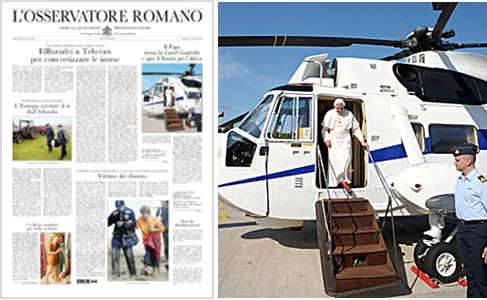
The Pope returns from Castel Gandolfo and opens Special Synodal Assembly for Africa
today. Other Page 1 storiesL IAEA head going to Iran preparatory to inspection of
previously-secret nuclear facility in Qom; Europe anticipates Ireland approving Lisbon
Treaty in second referendum; and Italy copes with deadly mudslide in Messina.
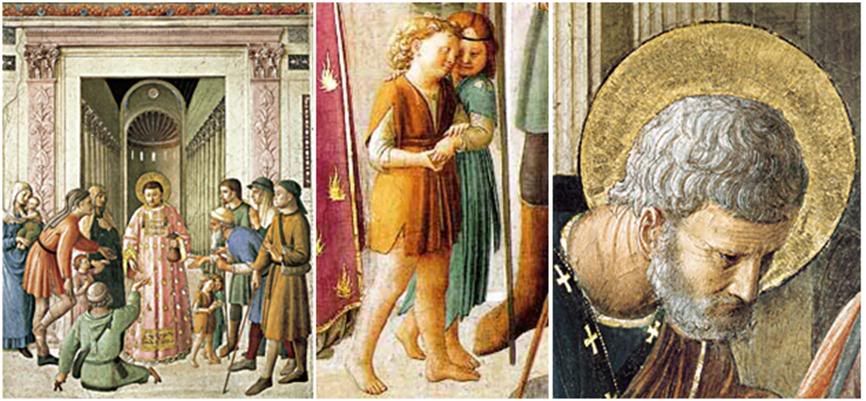 The teaser photo at the bottom of page 1 is a detail from a Fra Angelico fresco in the Niccoline Chapel which is part of the Vatican Museums open to nighttime visitors. An inside page article shows one full panel and another detail from the little-known frescoes painted by the Florentine monk and his pupil Benozzo Gozzoli.
THE POPE'S DAY
The teaser photo at the bottom of page 1 is a detail from a Fra Angelico fresco in the Niccoline Chapel which is part of the Vatican Museums open to nighttime visitors. An inside page article shows one full panel and another detail from the little-known frescoes painted by the Florentine monk and his pupil Benozzo Gozzoli.
THE POPE'S DAY
Opening Mass of Second Special Synodal Assembly for Africa.
Angelus.
[Modificato da TERESA BENEDETTA 04/10/2009 14:35] |
| |
 04/10/2009 13:42 04/10/2009 13:42 |
|
| | | OFFLINE | | Post: 18.557
Post: 1.210 | Registrato il: 28/08/2005
Registrato il: 20/01/2009 | Administratore | Utente Veteran | |
|


 MASS OPENS SECOND SPECIAL ASSEMBLY
MASS OPENS SECOND SPECIAL ASSEMBLY
FOR AFRICA OF THE BISHOPS SYNOD
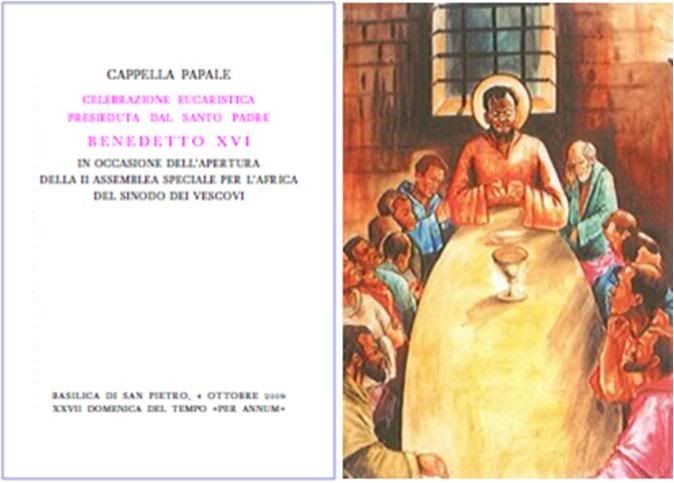
At 9:30 this morning, XXIII Sunday in ordinary time, the Holy Father presided at a Eucharistic celebration in St. Peter's Basilica with the Synodal fathers on the occasion of the opening of the Second Special Assembly for Africa of the Bishops' Synod.
Concelebrating were 239 Synodal bishops and 55 priests working with this Synodal assembly.
For the Eucharistic prayer, the principal concelebrants who joined the Pope were the three president-delegates of the Assembly - Cardinals Francis Arinze, emeritus Prefect of the Congregation for Divine Worship; Wilfrid Fox Napier, O.F.M., Archbishop of Durban (South Africa); and Théodore-Adrien Sarr, Archbishop of Dakar (Senegal); along with the General Moderator, Cardinal Peter Kodwo Appiah Turkson, Archbishop of Cape Coast (Ghana); the Secretary General of the Bishops' Synod, Mons. Nikola Eterović; and the two special secretaries for the assembly, Mons. Damião António Franklin, Arcivescovo of Luanda (Angola); and Mons. Edmond Djitangar, Bishop of Sarth (Chad).
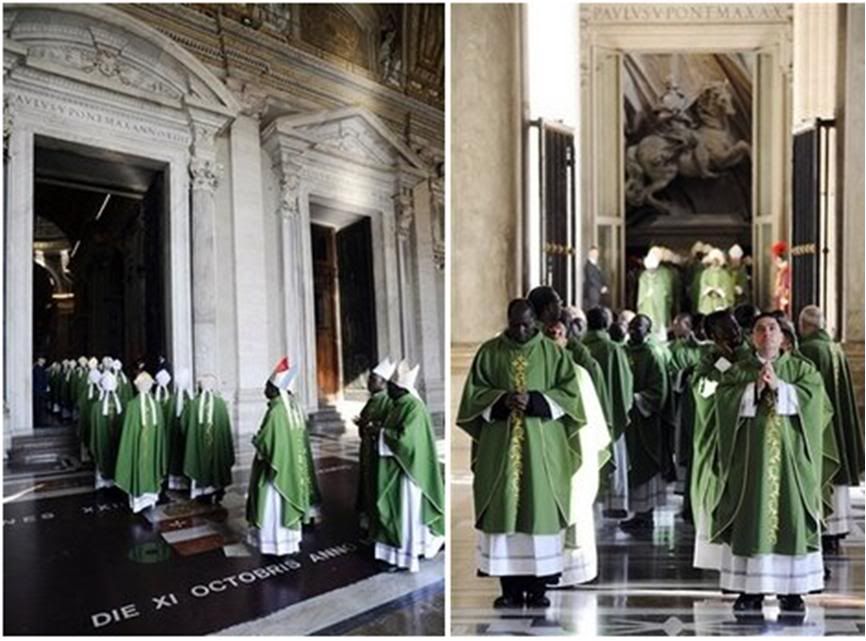
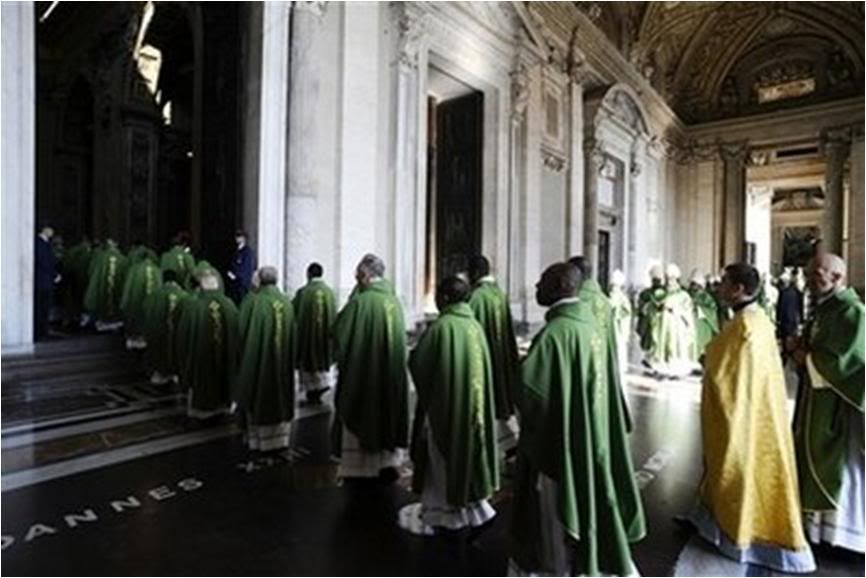
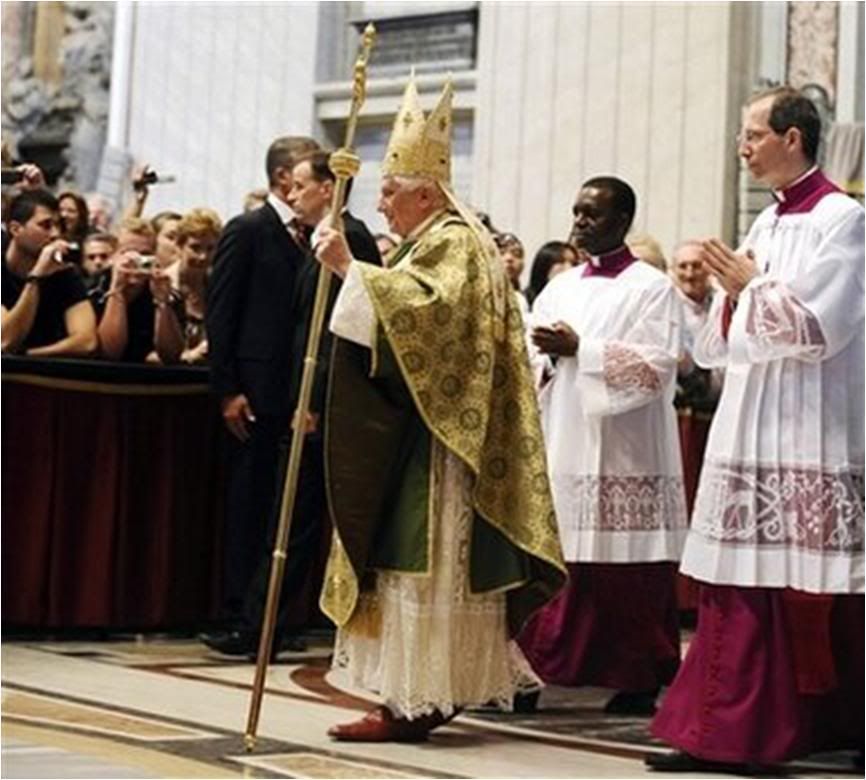
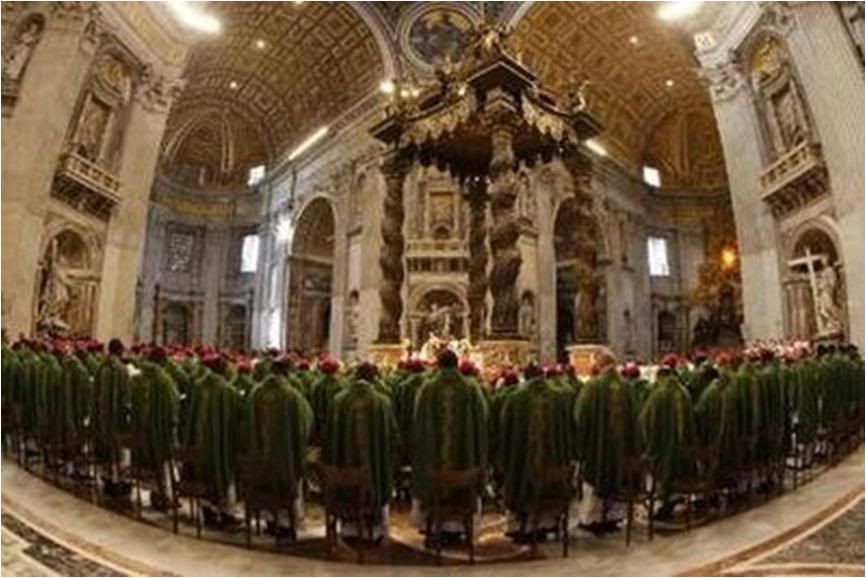 Pope says Africa is world's spiritual lung
Pope says Africa is world's spiritual lung
but harmed by materialism and fundamentalism

VATICAN CITY, Oct. 4 (AP) — Pope Benedict opened a special meeting of bishops on Africa on Sunday by praising the continent as the world's spiritual center but lamenting that it risks being afflicted by materialism and religious fundamentalism.
A Congolese choir — with bongo drums, electric guitars and swaying, ululating singers — filled St. Peter's Basilica with African hymns as Benedict formally opened the synod, a three-week gathering of some 300 prelates to discuss the church's problems in Africa.
Benedict praised Africa's rich cultural and spiritual treasures, saying they were the "spiritual lung" for a world increasingly in a crisis of faith and hope.
But he said Africa has also been afflicted by materialism — the "toxic spiritual garbage" exported by developed countries. "In this sense, colonialism — while finished in the political sphere — hasn't really ended," he said.
As a result, Africa is also at risk for increasing religious fundamentalism. Groups claiming to be from religious backgrounds are spreading across the continent.
"They are doing so in the name of God, but with a logic that is opposed to divine logic: teaching and working not with love and respect for freedom, but with intolerance and violence," he said.
He urged the Catholic Church in Africa to be a voice of reconciliation, justice and peace among the continent's various ethnic and religious groups.
The Catholic Church is growing enormously in Africa; between 1978 and 2007, the number of Catholics grew from 55 million to 146 million. Vatican statistics show that more than 17 percent of Africa's population is Catholic.
But at the same time, the region's poverty, conflicts and AIDS have posed challenges for the church. Among the thorny issues that bishops might raise at the synod is the Vatican's ban on condom use. Many say condoms could help prevent the spread of AIDS on the continent. [This is the writer injecting his own political agenda into this report.]
During the meeting, several outside experts will be addressing the prelates, including the head of the U.N.-African Union peacekeeping force for Darfur, Sudan, and the head of the U.N. Food and Agriculture Organization [who is Muslim].
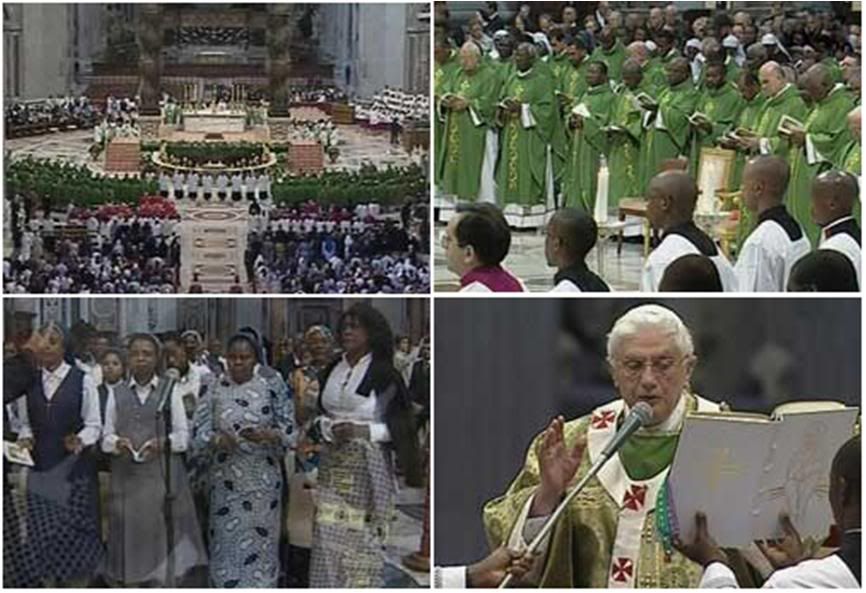
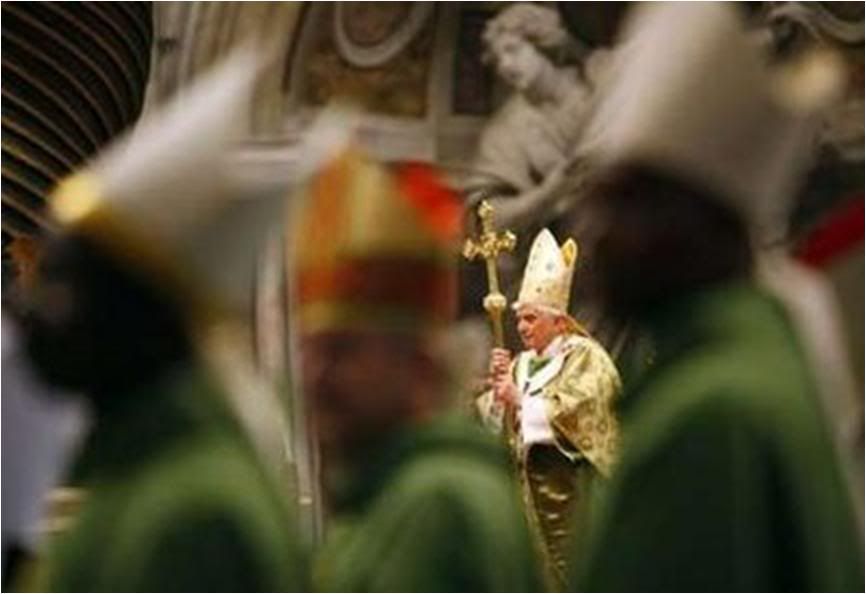
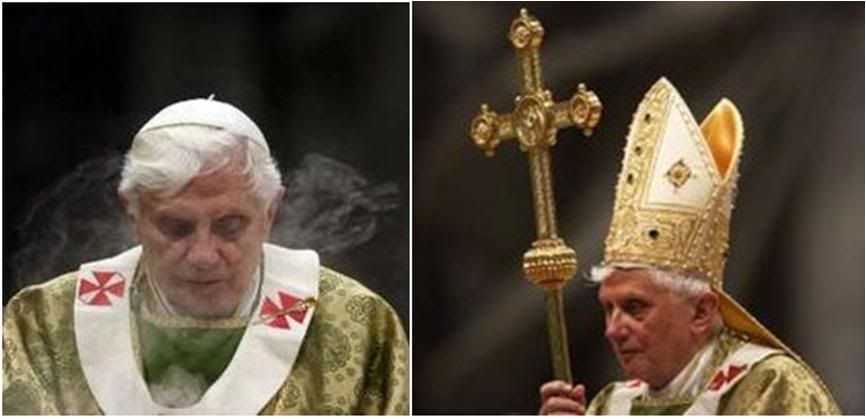
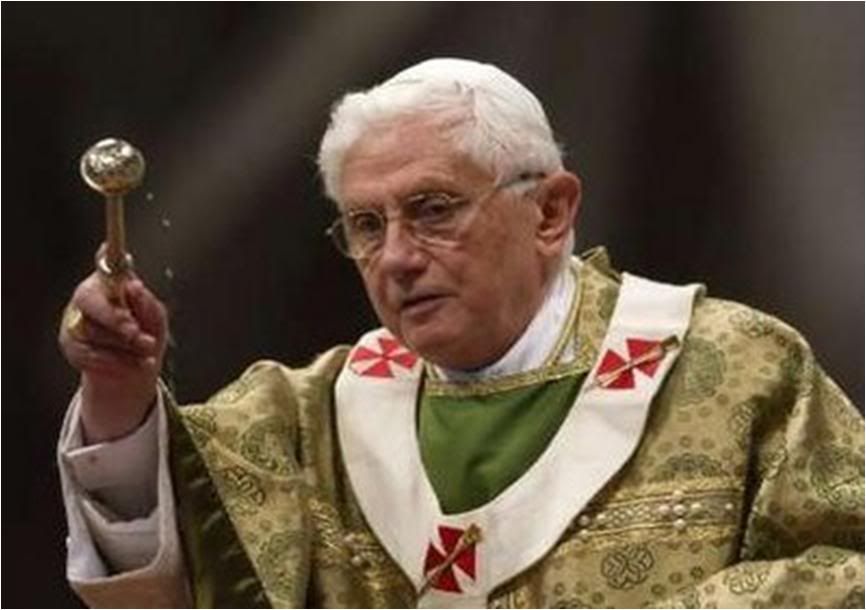
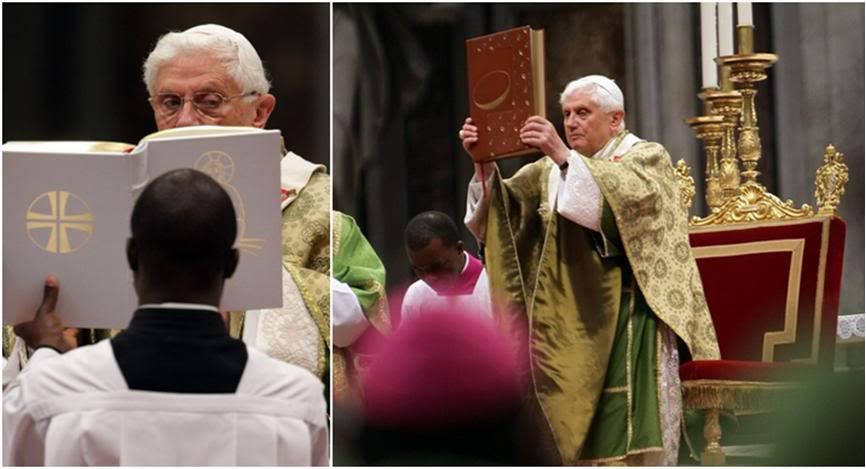 Here is a translation of the Holy Father's homily:
Here is a translation of the Holy Father's homily:
THE HOLY FATHER'S HOMILY
Venerated Brothers in the Episcopate and Priesthood,
Distinguished ladies and gentlemen,
Dear brothers and sisters!
Pax vobis – peace be with you!
With this liturgical greeting I address all of you gathered here in the Vatican Basilica where, 15 years ago, on April 10, 1994, the Servant of God John Paul II opened the first Special Assembly for Africa of the Bishops' Synod.
The fact that we find ourselves here today to inaugurate the second means that the first was a historic event but not an isolated one. It was the first goal in a journey that has gone on and now reaches a new significant stage of verification and renewal. For this let us praise the Lord!
I address my most hertfelt welcome to the members of the Synodal assembly who are concelebrating this Holy Eucharist with me, and to the experts and auditors, particularly those who come from African lands. I greet with special acknowledgment the Secretary General of the Synod and his co-workers.
I am very happy for the presence among us of His Holiness Abuna Paulos, Patriarch of the Tewanedo Orthodox Church of Ethiopia, whom I cordially thank, and the fraternal delegates from other churches and ecclesial communities.
Likewise, I am happy to welcome the civilian authorities and the distinguished ambassadors who are with us for this occasion. With affection, I greet the priests, religious, representatives of Church, organisms, movements and associations, and the Congolese choir which, together with the Sistine Choir, animate our celebration today.
The Biblical readings this Sunday speak of matrimony. But more radically, they speak of the design of creation, of the origins, and therefore, of God. The second Reading, taken from the letter to the Hebrews, converges with this theme where it says: "He who consecrates [namely, Jesus Christ] and those who are being consecrated all have one origin. Therefore, he is not ashamed to call them brothers" (Heb 2,11).
The entire readings then highlight in evident ways the primacy of God the Creator, with the perennial validity of his original imprint and the absolute precedence of his lordship - that lordship which children know better to accept than adults, which is why Jesus points to them as the model for entering the kingdom of the heavens (cfr Mt 10,13-15).
Acknowledgment of the absolute lordship of God is certainly one of the outstanding and unifying traits of African culture. Naturally, AFrica has many diverse cultures, but all seem to agree on this point: God is the Creator and source of life.
Life, as we know very well, is manifested primarily in the union between a man and a woman and in the birth of children arising from that union. Divine law, written in Nature, is therefore stronger and pre-eminent over every human law, according to the clear and concise statement by Jesus: "What God has joined together, no human being must separate" (Mk 10,9). The perspective is not primarily moral: Before it is a duty, it has to do with 'being' itself, the order inscribed in Creation.
Dear brothers and sisters, in this sense, today's liturgy of the Word - beyond the first impression - is particularly appropriate to accompany the opening of a Synodal assembly dedicated to Africa. I would underscore in particular some aspects which emerge forcefully and which concern the work which we face.
The first which I have already referred to is the primacy of God, Creator and Lord. The second is matrimony. The third - children.
On the first aspect, Africa is the repository of an inestimable treasure for the entire world: her profound sense of God, which I had occasion to perceive directly in my meetings with African bishops on ad limina visit, and even more during the recent apostolic trip to Cameroon and Angola, of which I have grateful and emotional memories.
It is to that prilgrimage to African lands that I wish to refer now, because at that time, I ideally opened this Synodal assembly in handing over the Instrumentum laboris to the presidents of the bishops' conferences and to the heads of the Bishops' Synod of the Oriental Catholic Churches.
When we talk about Africa's treasures, we think right away of the resources in which your territory is rich, and which, unfortunately, have become - and will perhaps continue to be - a cause of exploitation, conflicts and corruption.
But the Word of God makes us look at another patrimony - the spiritual and cultural, which mankind needs even more than raw materials. In fact, Jesus says, "What profit is there for one to gain the whole world and forfeit his life?" (Mk 8,36).
From this point of view, Africa represents an immense spiritual 'lung' for mankind which appears to be in a crisis of faith and hope.
But even this lung can become sick. At the moment, at least two dangerous pathologies are eating at it: first of all, an ailment already wqidespread in the Western world, which is practical materialism, combined with relativist and nihilist thinking.
Without entering into the genesis of such spiritual evils, it is nonetheless indisputable that the so-called First World has often exported and is exporting toxic spiritual wastes which infect the peoples of other continents, Africa among them.
In this sense, colonialism, which is finished on the political level, has never been really terminated. Precisely in this perspective, one can point out the second 'virus' that could also undermine Africa, namely, religious fundamentalism mixed in with political and economic interests.
Groups belonging to various religious affiliations are spreading throughout the African continent – they do so in the name of God but following a logic opposed to the divine, teaching and practicing not love and respect of freedom, but intolerance and violence.
On the subject of matrimony, Chapter 2 of Genesis reminds us of its perennial foundation, which Jesus himself confirmed: “That is why a man leaves his father and mother and clings to his wife, and the two of them become one body” (Gn 3,24).
How can we not remember the admirable cycle of catecheses that the Servant of God John Paul II dedicated to this subject, in an exegesis in depth of this Biblical text?
Today, as proposed to us at the opening of this Synod, the liturgy offers us the super-abundant light of truth revealed and incarnated in Christ, with which we may consider the complex subject of matrimony in the ecclesial and cultural context of Africa.
Even on this point, I wish to take up briefly a suggestion that precedes every reflection and instruction of a moral type, and which also links to the primacy of the sense of the sacred, and of God.
Matrimony, as the Bible presents it to us, does not exist outside of a relationship with God. The conjugal life of a man and a woman and thus, of the family that comes from it, is inscribed in communion with God. And in the light of the New Testament, it becomes an icon of Trinitarian love and a sacrament of Christ’s union with the Church.
To the measure in which Africa conserves and develops its faith, it can find immense resources to give to the family based on matrimony.
As the Gospel passage also includes Jesus’s text on children (Mk 10,13-15), the liturgy invites us to bear in mind, within our pastoral concerns, the reality of childhood, which constitutes a great and unfortunately suffering part of the African population.
In the scene where Jesus welcomes the children, opposing his own disciples who wished to keep them away, we see the image of the Church which, in Africa as in other parts of the world, shows her motherhood above all towards the littles ones, even when they are not yet born.
Like the Lord Jesus, the Church does not see them primarily as recipients of assistance, much less of pietism and of instrumentalization, but as persons with full title, whose very way of being shows us the master way for entering the Kingdom of God, namely, by entrusting ourselves unconditionally to his love.
Dear brothers, these indications coming from the Word of God fit into the broad horizon of the Synodal assembly which begins today and which links to the one previously dedicated to the African continent, whose results were presented by Pope John Paul II of venerated memory in the Apostolic Exhortation Ecclesia in Africa.
Of course, the primary task of evangelization remains valid and actual - a new evangelization that takes into account the rapid social changes in our day and the worldwide phenomenon of globalization. We can say the same for the pastoral choice to build the Church as the family of God (cfr ivi, 63).
It is in that great wake that the second Assembly takes place on the theme: “The Church in Africa at the service of reconciliation, justice and peace – ‘You are the salt of the earth… you are the light of the world’ (Mt 5,13-14)”.
In recent years, the Catholic Church in Africa has known great dynamism, and this Synodal meeting is an occasion to thank the Lord. But since the growth of the ecclesial community in all sectors also brings with it challenges ad intra and ad extra, the Synod is the right moment to rethink pastoral activities and renew the thrust for evangelization.
To become light of the world and salt of the earth, we must also set our signts on the ‘superior standard’ of Christian life, namely, holiness. The Pastors and all members of the ecclesial community are called on to be holy. The faithful are called on to spread the perfume of holiness in the family, in the workplace, in schools and in every other social and political field.
May the Church in Africa always be a family of authentic disciples of Christ, where differences among races and tribes become a motivation and a stimulus for reciprocal human and spiritual enrichment.
With her work of evangelization and human promotion, the Church in Africa can certainly make a great contribution to all of society, which unfortunately, in many countries experiences poverty, injustice, violence and war.
The vocation of the Church – a community of persons reconciled with God and each other – is to be prophecy and ferment for reconciliation among various ethnic, linguistic and even religious groups within each nation and in the whole continent.
Reconciliation, a gift of God that man should implre and accept, is the stable foundation on which to build peace, an indispensable condition for the authentic progress of man and societies according th God’s plan of justice.
Open to the redeeming grace of the risen Lord, Africa will thus be ever more illuminated by his light, and - allowing herself to be guided by the Holy Spirit - will become a blessing for the universal Church, bringing her own special contribution to the edification of a more just and fraternal world.
Dear Synodal fathers, thank you for the contribution which each of you will be making to our work in the coming weeks, which shall be for us a renewed experience of fraternal communion redounding to the benefit of the whole Church, especially in the context of the Year for Priests.
To you, dear brothers and sisters, I ask you to accompany us with your prayers. I ask it of those present. I ask it of the cloistered orders and the religious communities throughout Africa and every part of the world, of parishes and movements, of the sick and the suffering. I ask all to pray so that the Lord may make this second special assembly for Africa fruitful.
Let us invoke for it the protection of St. Francis of Assisi, whom we commemorate today, of all the African saints, and especially, the Blessed Virgin Mary, Mother of the Church and Our Lady of Africa. Amen.
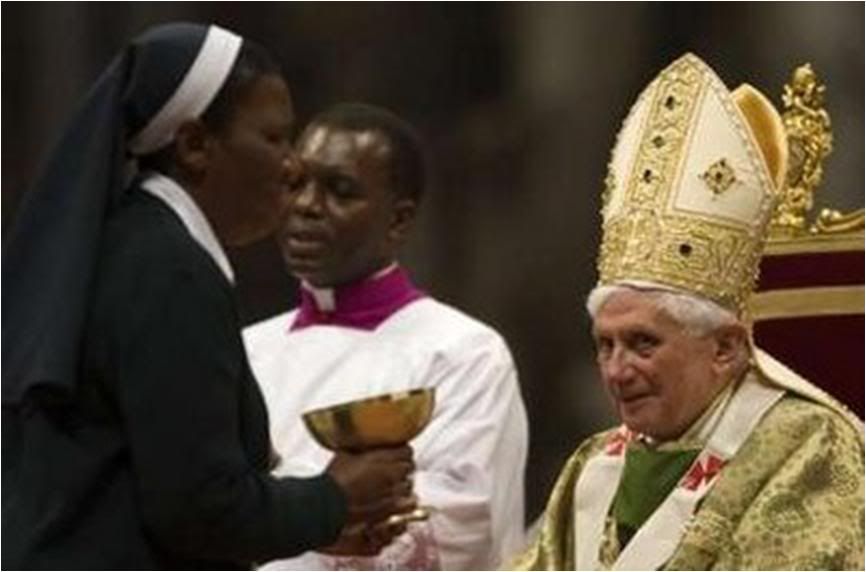
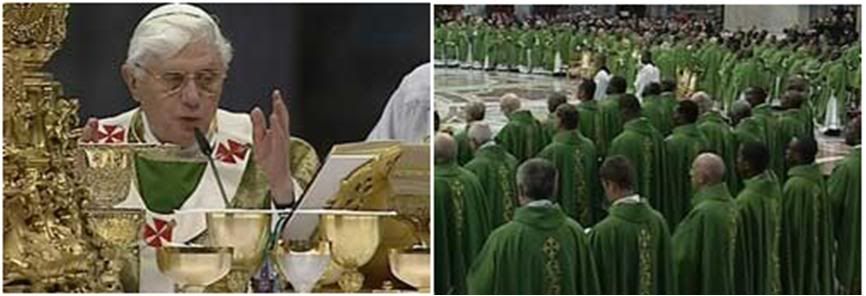
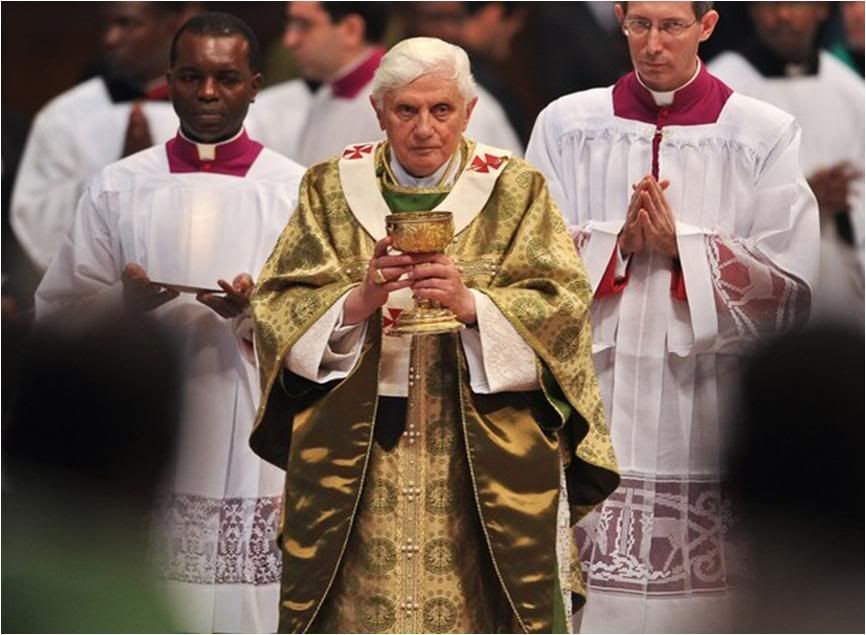
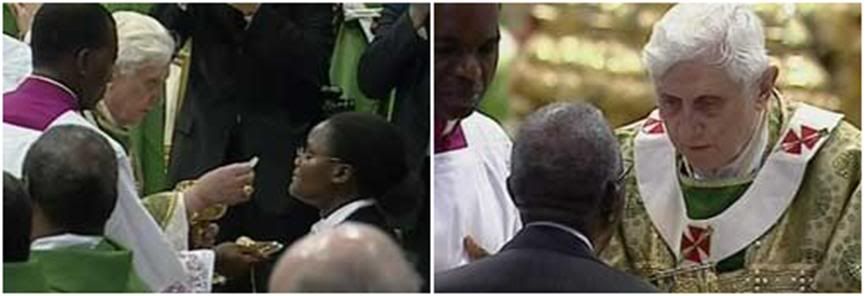
[Modificato da TERESA BENEDETTA 04/10/2009 22:25] |
| |
|
|
|
|